“There’s a man on the phone,” my mother told me. “He says he’s from Walt Disney.”
Under normal circumstances, I would have dismissed this as a practical joke perpetrated by one of my friends, all of whom knew that my lifelong ambition was to work for a film studio. However, recent events had not been normal, and there was the possibility that the man on the phone was legit.
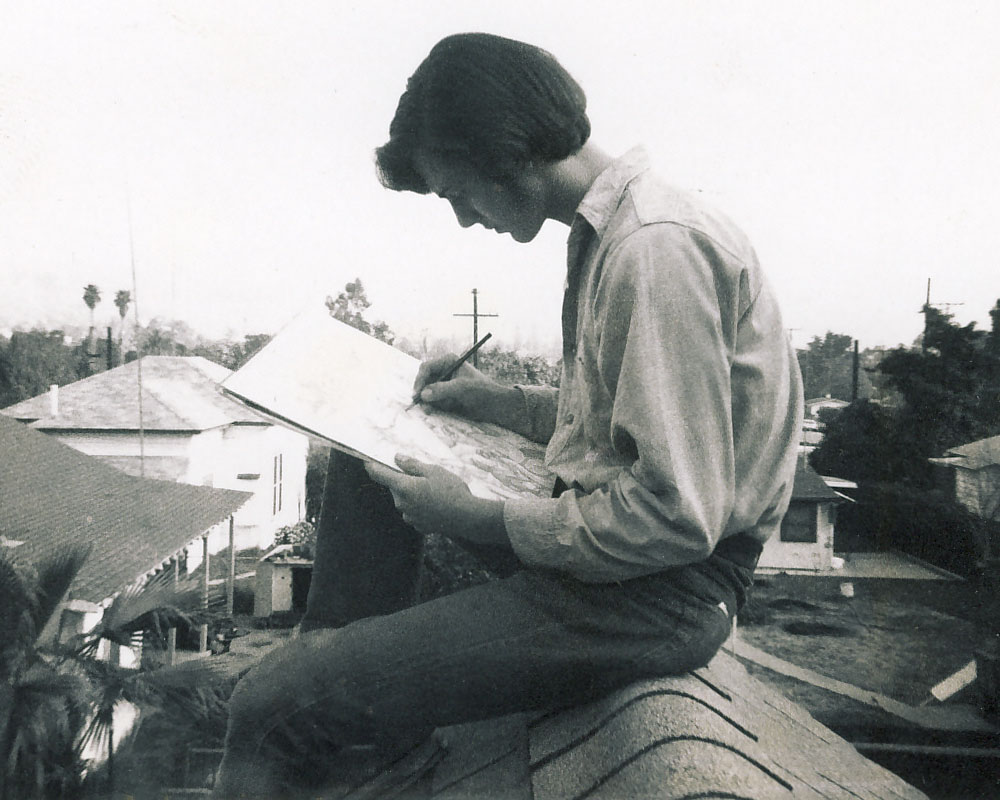
In the Fall of 1974, I was a senior at Santa Barbara High School. A few months before the phone call, I was one of a handful of students invited to an Art Teachers convention at the Disneyland Hotel in Anaheim, California. After listening to a lecture on theme park design, I introduced myself to the speaker, a man named John Hench, Vice President of WED Enterprises. I told him that my friends and I made films, and I persuaded him that we should get a tour of his company.
Fast forward a few weeks.
The principal members of Paragon Productions (there were four of us who had filed a DBA the year before and would disband after we graduated High School) were at WED Enterprises. WED was short for Walter Elias Disney. The company has since changed its name to Disney Imagineering, but it was then and is now the division that develops the theme parks.
Within their facility on Flower Street in Glendale awaited wonders uncountable. Artisans in the Model Shop crafted detailed miniatures of Disneyland attractions. Shelves in the Sculpture Department held life-like figurines and full-size heads of presidents and pirates that looked as if they had been moving the moment before you glanced at them and would move again the moment you to turned away. Peeking into the Show Designers’ offices, you saw elaborate sketches and full-color paintings of future projects. All of these were delights to the senses of four teenagers from Santa Barbara.
“We brought some of our 8mm films with us,” I mentioned to John Hence’s assistant after the tour. “Would you like to see them?”
“I’d love to,” said the assistant who had already given us an hour and a half of his day. “But we don’t have an 8mm projector.” It was a polite sidestep. Too bad it did not work.
“We brought a projector with us,” I cheerfully replied.
“How come you showed your films to WED, and you didn’t show them to us in Feature Animation?”
We are back to the beginning of the story. The man on the phone had just introduced himself as Ed Hansen, Head of Personnel for Animation at Walt Disney Pictures. I did not know him at the time, so I was unfamiliar with Ed’s sometimes misplaced sense of humor. I remember little of that conversation, but what mattered was that someone from a major motion picture studio knew who I was and wanted to see my work. We made arrangements for me to return along with my cohorts Keith, Jeff, and Bruce.
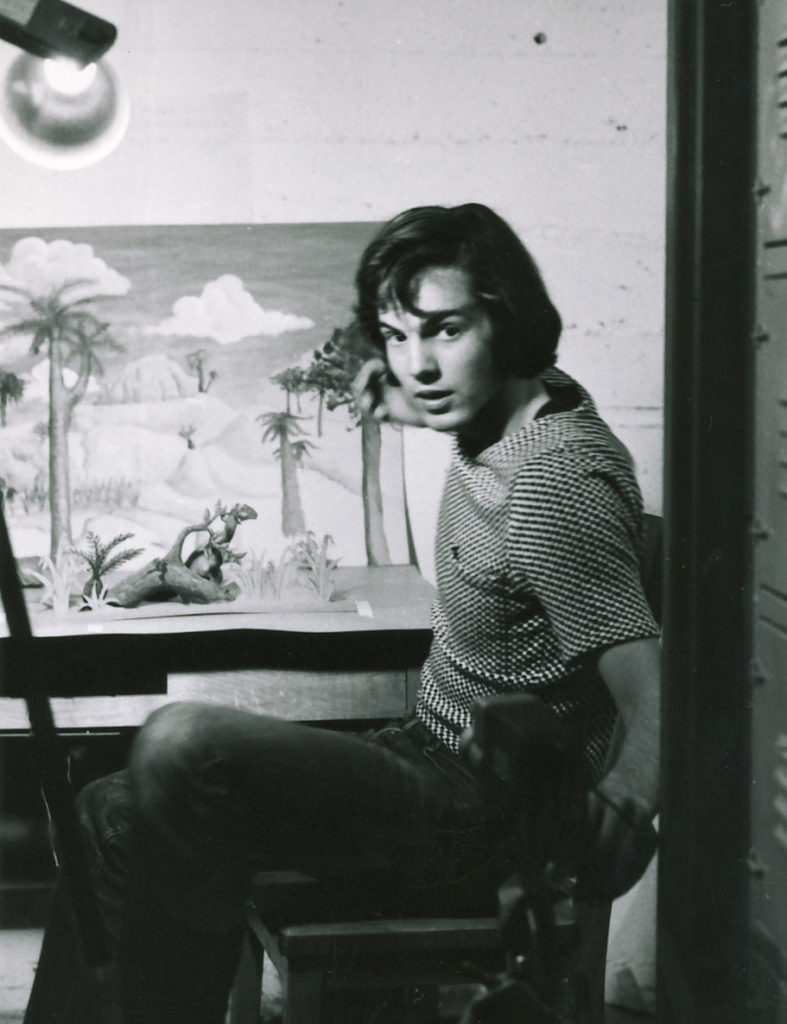
The films we made together lacked budget and polish, but they had ambition and imaginative storytelling. Some featured stop-motion animation. They got us through the front door at Disney. What we did not know was that Disney had a mandate to find new talent. When Walt built Disneyland, his interest in animation diminished, and after his death, the feature film department plodded along as older employees trickled away. But the films continued to make money, and the merchandising was always lucrative. Some executives realized that keeping this particular cash cow alive meant replenishing the workforce. To that end, they instigated a new Character Animation program at the California Institute of the Arts. They had teachers. They had funding. They needed students.
I did not aspire to be an animator, but I wanted to work at a film studio, so when Ed Hansen talked about opportunities at Disney, I listened. He invited the four of us to submit portfolios. Bruce and I did. Keith and Jeff had plans to study filmmaking at San Francisco State, but Jeff eventually followed us to Cal Arts three years later.
Things were happening fast.
Bruce had submitted his portfolio before me and got accepted first. I was still debating the merits of Cal Arts when Jack Hannah called me. Jack, a veteran Disney animator, was the new dean of the program. “Yours wasn’t the best portfolio we received, but –” here he paused for dramatic effect. “It was pretty high up there, so we’re giving you a full scholarship.”
And just like that, I was going to college.
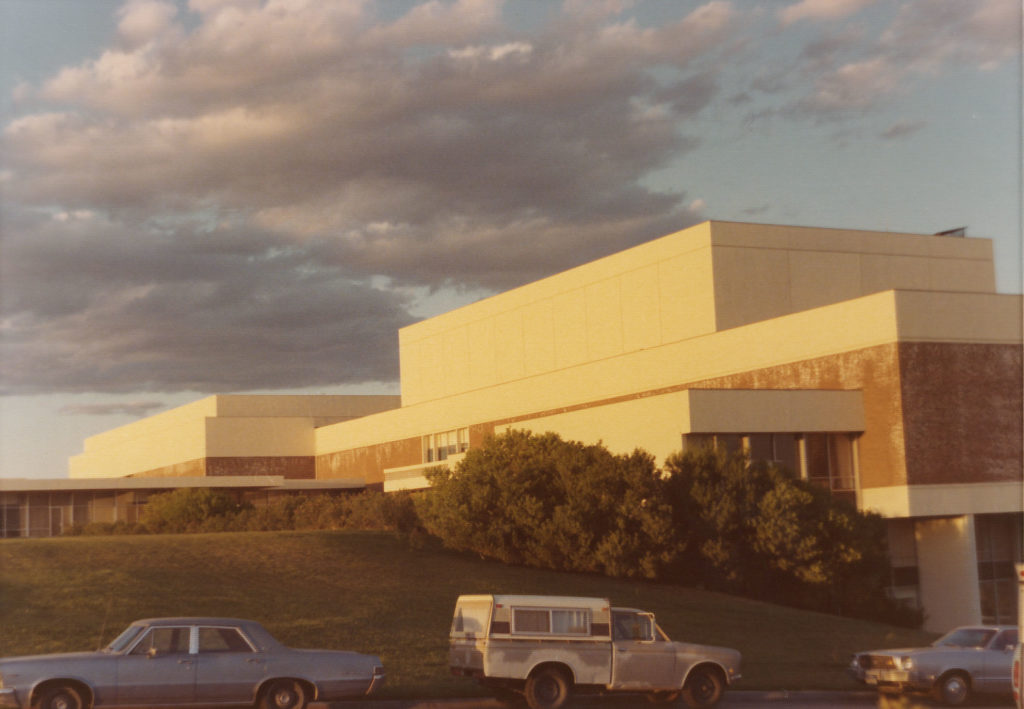
Our first-year class in the Character Animation Program was a small but extraordinary group of people. Vanity Fair did an article about us in their 2014 March issue. I have been an animator, sculptor, illustrator, storyboard artist, screenwriter, TV and feature film director, and producer. Yet, compared with many of my classmates, I am an underachiever. Some of my fellow students were Brad Bird, John Lasseter, John Musker, and Tim Burton. By dint of our creative ambitions, all of us had done something to get noticed by Disney. Since the Character Animation Program did not exist before we got there, we had not gone looking for it. None of us knew if Cal Arts would lead to a career in the entertainment industry. Disney’s best days seemed to be behind it, and there were few other studios where an animator could earn a living. Still, we motivated each other with our aspirations and dreamed in CinemaScope.
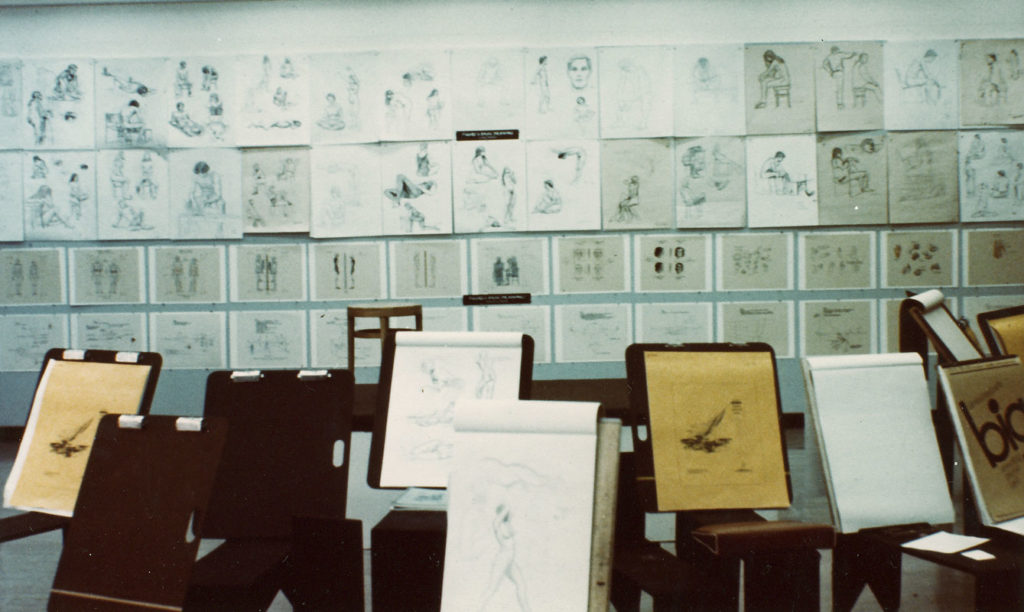
In the first year, all of our classes took place in a windowless basement room. Its alphanumeric designation was A-113. Animation fans may be familiar with that combination of letters and numbers because A-113 now appears in many Disney and Pixar animated films. Would it be immortalized in this manner if that room had been more agreeable, maybe had a single window or better ventilation? I wonder.
In 1975 “A Chorus Line” opened on Broadway, “Jaws” became the first blockbuster movie, and Gerald Ford was about to leave the Whitehouse in a peaceful transfer of power to Jimmy Carter. We did our class assignments, listened to Elton John, and watched Saturday Night Live. We started the academic year with twenty-five students and ended with less than twenty.
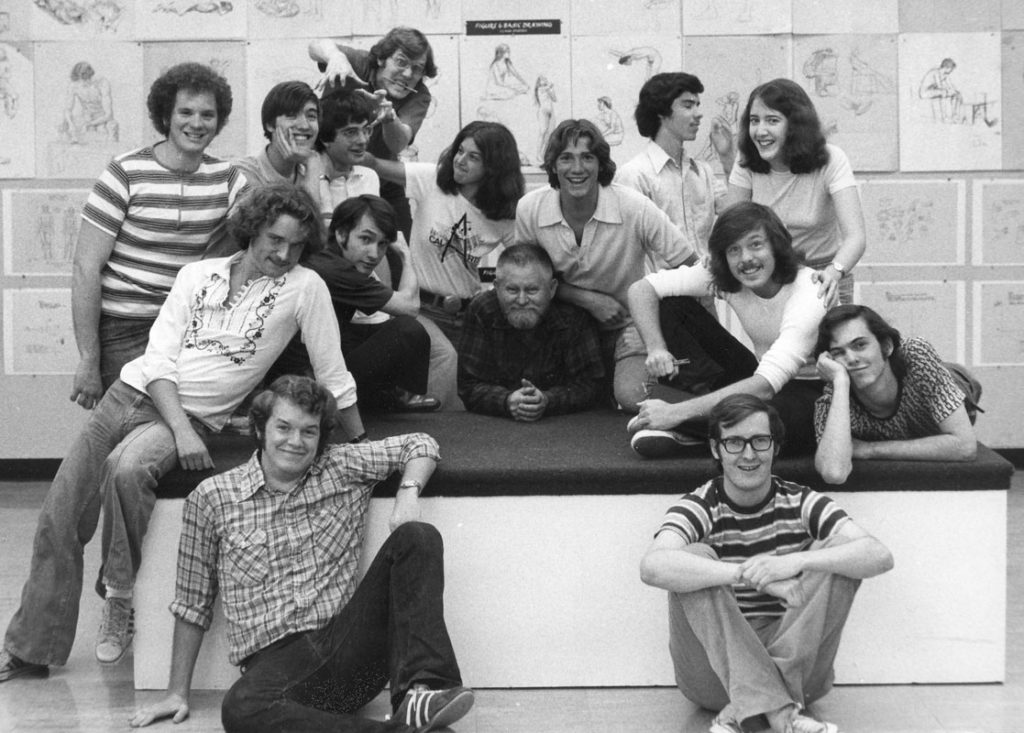
Cal Arts consisted of five schools: Film, Theater, Music, Dance, and Art. Character Animation was a part of the Film School, even though most of our classes involved drawing. We were encouraged to interact with the other schools, but we rarely did. The first student I met from the Art School told me that our program did not belong at Cal Arts. “This is a fine art college,” he insisted. “Animation the way you’re learning it is a Craft and not an Art.”
The second-year at Cal Arts was better. There were more of us in Character Animation, and we upgraded to classrooms with windows. We also got some new teachers, T Hee for Caricature and Ken O’Connor for Layout and Perspective. Ken became my favorite instructor. He taught us how to create worlds and place our characters believably into them. Each academic year culminated in a review ceremony attended by personnel from Disney. They came to encourage and evaluate us. After the second-year review, my former roommate Brad Bird came to find me. “Jack Hannah wants you, me, John Musker, and Jerry Rees in his office,” he told me.
“Why?” I asked. “Are we in trouble?”
“I think they’re going to offer us jobs at Disney,” he said.
“You’re crazy,” I told Brad. “They might offer jobs to John and Jerry, but they’re not going to give jobs to you and me.”
But Brad was right. I was wrong.
It was now 1977. “Star Wars” was about to change everything in Hollywood when John, Jerry, Brad, and I became the first students from the Character Animation program hired at Walt Disney Pictures. I was twenty years old, and I had achieved my life’s ambition to work for a film studio. I knew that I would have to retool my goals, I did not want to be an animator for the rest of my career, but that was a problem for the future.
For the moment, I was pretty damned pleased with myself.
By Doug Lefler
Bryn was gone for more than a week.
“King Edryd wants me to perform for him?” the young man asked the emissary.
They were standing to the side of the raised platform that served as a stage. The crowds were dispersing, but the clapping and shouting from the audience still reverberated in Bryn’s head. The Festival of Enlightenment had been a brilliant success for him. Although each morning when he woke, he thought of Modesty, the sound of applause had not lost its hold on Bryn. He was chained to two oxen, each pulling him in a different direction, and he could not tell which force was dominant.
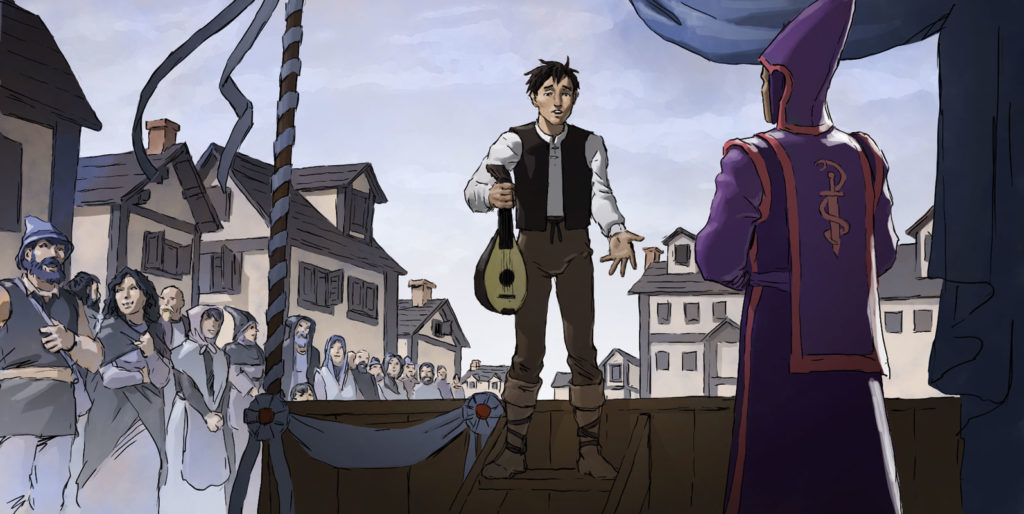
“Our Majesty commands a performance next Friday, in the Great Hall of Ironhorn.” The emissary wore robes dyed a rich purple. It was a color the common folk could not afford. “Can I assure him that you will oblige?”
Bryn was a quick young man and could have manufactured devices to evade this request, but perhaps we can forgive him that he did not. He was a musician by trade, and this was a command performance for the King of Ironhorn.
“The King would like to hear one song in particular,” the emissary said as he turned to leave. “‘Lady of the Trees’.”
Bryn had never been inside a castle before. He had never seen a room with a ceiling so high as the Great Hall of Ironhorn. Rooms this spacious were difficult to heat, but the fireplace at the North end of the Hall was big enough to park a coach and four inside it.
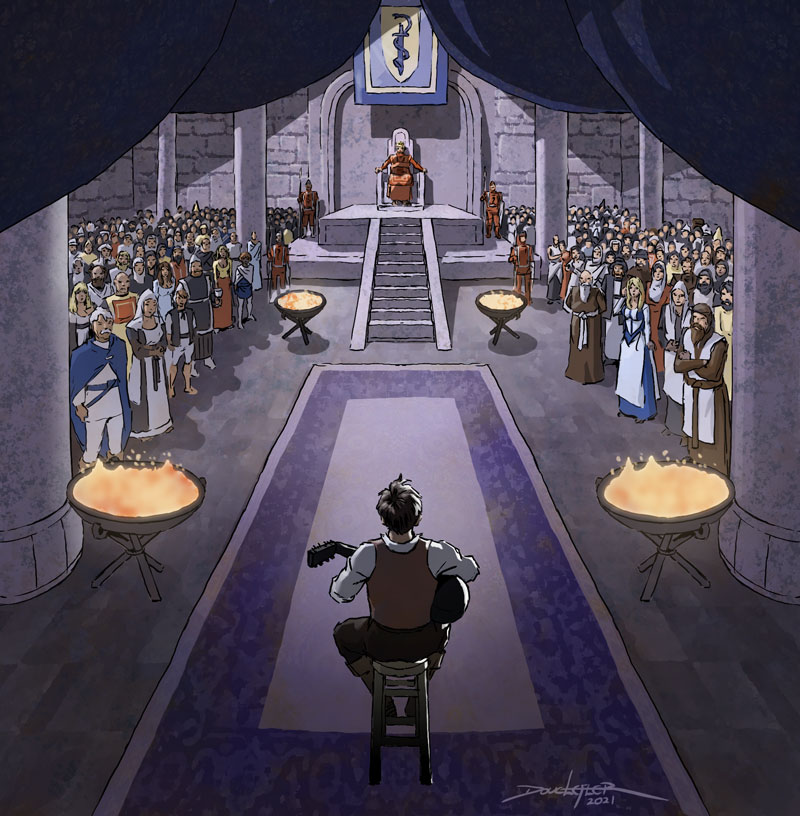
Never had Bryn tasted venison or falcon-caught pheasant in a stew flavored with saffron and ginger. Never had he played to an audience that wore so much silk and velvet. When his hour came to perform, Bryn did not falter. The Minstrel found his voice and played as he had never done before. He thought about his indulgent father and long-suffering mother. How proud they would be if they could see him this evening. His thoughts wandered to “The Gryphon of Calamity,” the song extolling the adventures of the Three Huntsmen, composed with a simple melody and straightforward lyrics by the current Minstrel to the Court of King Edryd. “I can do better,” Bryn thought as his eyes feasted on the glory of the Great Hall. “All of this could be mine!”
“King Edryd wishes to speak with you.” The purple-clad emissary had returned as Bryn conversed with a young lady in an embroidered red dress. “Would you please await him in the East Hall?”
“Well,” the lady in the red dress raised an eyebrow and smiled at the Minstrel. “You mustn’t keep our King waiting.” She gave Bryn an elegant curtsy and turned to rejoin the mingling crowd. Bryn guessed the purpose of this meeting. The position of Court Minstrel was all but his.
The bear stared down at Bryn with unmitigated ferocity and unsheathed teeth. It was the largest bear the young man had ever seen and certainly the closest he had ever stood to one. The emissary closed the door to the East Hall behind him, and Bryn knew that he was trapped inside with this redoubtable creature. But the bear did not lunge. It remained frozen in its rage as if by a spell, with eyes unblinking and lifeless. Bryn glanced beyond the beast to see other creatures in the room, all locked in life-like poses but with vacant eyes.
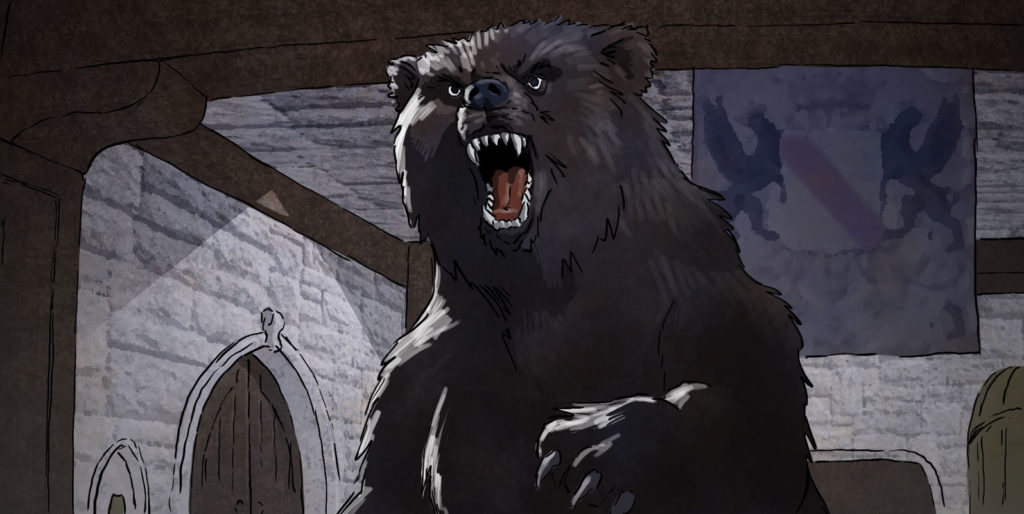
“Are you familiar,” asked a cultured voice, “with the modern science of taxidermy?”
Bryn turned to find King Edryd behind him. The Minstrel bowed as low as he had ever done in his life.
“Oh, please,” the King motioned him to stand. He was a tall man of advanced years with a short, cropped beard and a walking stick inlaid with gold. “That’s hardly necessary outside of the Court.”
“If you please, your Majesty,” Bryn gestured to the bear. “How is it done?”
“The craftsman makes an incision in the slain animal here,” King Edryd raised his walking stick and pointed to a spot just below the chin of the bear, “it runs from the throat, down the belly to the groin.” he traced the path that the blade had made. “The skin is carefully removed along with the skull, paws, and feet. Everything else is extracted, muscle, skeleton, and innards, and precisely measure so that a framework of wood and papier-mache can replace them. The brains are spooned from the skull, and the eyes are replaced with glass. The results are as you see in this room. Look over here.”
Bryn followed the King to a raised platform that held a vast feline creature with a prodigious head made more imposing by a thick mane of hair about its neck.
“Is it a lion?” Asked Bryn.
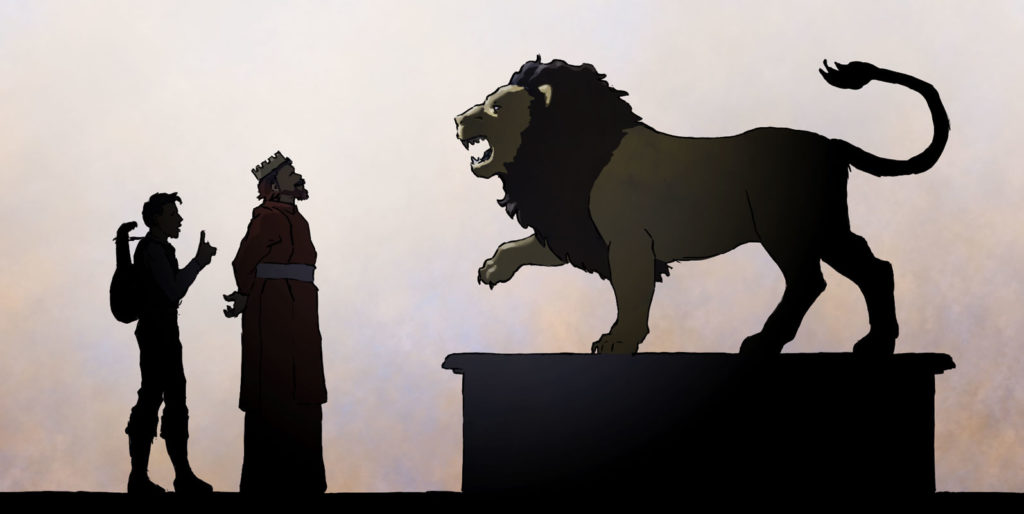
“Very good,” replied the King. “All the way from the Dark Continent. We kept the creature alive until it got here so that it would be fresh. I intend to open this Hall to the common folk every other Tuesday so that the people – the tradesmen, the women, the little children — can marvel at my collection.”
“It may give some of them nightmares,” Bryn smiled but immediately regretted this attempt at humor.
The King paid no attention as he walked about the Hall, waving his stick like a showman.
“Taxidermy is a way of preserving the wonders of the Natural World. It is not unlike what you do in song.”
“How is that, your Majesty?”
“You capture a moment, a story, a feeling – in rhyme and melody. And if the song is good, it will outlast us both.”
“This is true, your Majesty,” Bryn agreed. “In my repertoire, I have songs that were written in the long-demised Court of Zarmyth, over two hundred years ago.”
“Ah, young man,” the King enthused. “You begin to see why I invited you here.”
“You want me to write songs about bears and lions?” Bryn asked.
King Edryd dismissed that idea with a wave of his stick. “What, this? No. Preserving the Natural World is something for the peasants. Merely practice for what truly matters. Come with me!”
When the King threw open the ornate double doors, Bryn realized that the room with the bear and the other dead creatures was a mere antechamber. The Hall they entered had to be much grander, for a dragon stood in the middle of it.
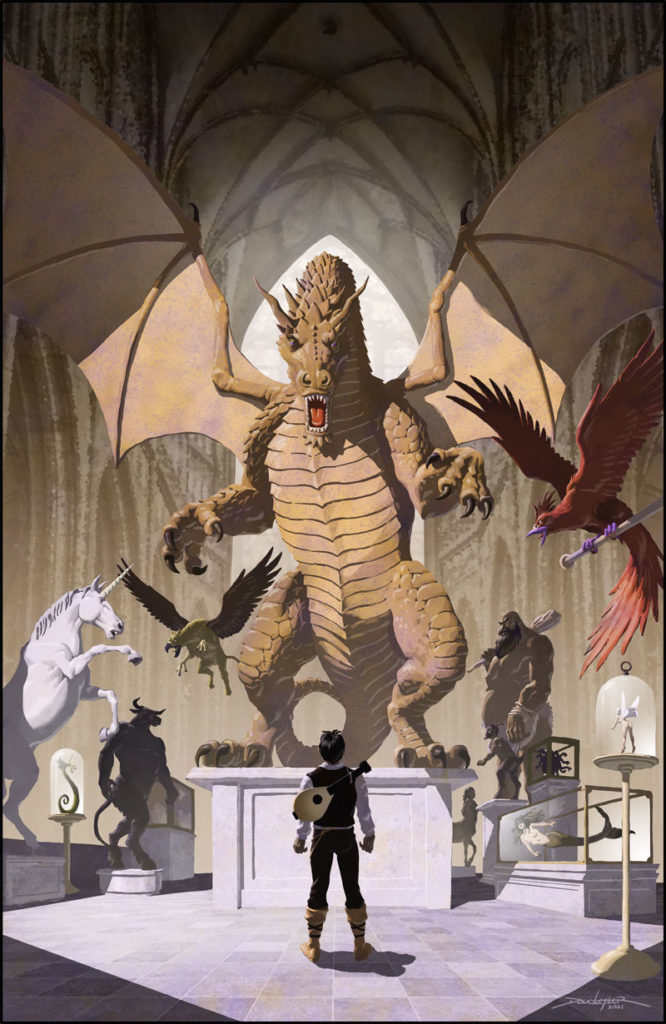
“My passion is preserving the wonders of the Fairie World,” King Edryd announced.
Bryn entered the room with a mixture of awe and apprehension. The Dragon towered above him with leathery wings half spread as if it was about to take flight. Its fiery scales were like a suit of armor, causing Bryn to wonder how anyone had managed to kill such a thing.
He looked about the room. A mermaid floated in a tank of yellow liquid, staring back at Bryn with her glass eyes. A unicorn had one hoof raised and its golden horn lowered, suspended in a moment before making a charge. There were Ogres and Leprechauns, Goblins, Hop-Goblins, and Gnomes. Protected under glass was a collection of fairies and a Phoenix Bird. In the middle of the room beyond the Dragon was a Cyclops and a Minotaur. Bryn identified the fabled Gryphon of Calamity, its wings spread in flight, hanging from chains attached to the rafters. There were Fauns and Werewolves and a Basilisk, and countless other creatures that Bryn could not identify.
“What do you think?” asked the King.
“It is awe-inspiring,” the Minstrel felt the need to pick his words carefully.
“And almost complete,” insisted the King. “Of course, there are many variants of Pixies and Elves that I don’t possess; but the only critical creature that I’m missing is a Hamadryad.”
Byrn’s heart pounded in his chest. “They are extinct, your Majesty.”
“Maybe. Maybe not. Your song “Lady of the Trees” is about one, is it not?”
“A work of fiction, your Majesty.”
“But it has the ring of truth to it.”
“Thank you. That was my aim.”
King Edryd took Bryn’s arm and led him toward the far end of the chamber. “Inspiration works in mysterious ways. Perhaps you were visited by a Hamadryad and didn’t know it. Perhaps in your sleep, or as you wrote, ‘passing through Old Badger Woods.'”
Dammit! Why did he add those lyrics to the last verse? “I suppose it’s possible, your Majesty, although unlikely.”
“If so, you are lucky to be alive. Hamadryads are cunning and dangerous creatures.”
“Are they? I heard they were passive and wouldn’t even protect themselves when threatened.”
“Balderdash!” The King snorted. “Old wives’ tales. I have it on authority that a Hamadryad once destroyed the entire village of Mer for the cutting of a single tree. My knowledge in these matters is extensive. For that reason, I outfitted the Huntsmen with the latest weaponry when I commissioned them.”
“The Huntsmen?” Bryn asked.
“Of Craggulch,” the King explained. “They are searching Old Badger Wood now.” King Edryd had led Bryn to an open platform at the far end of the Hall. “If they find one, my life’s work is complete…”
An inscribed metal plaque attached to the platform read: ‘HAMADRYAD.’
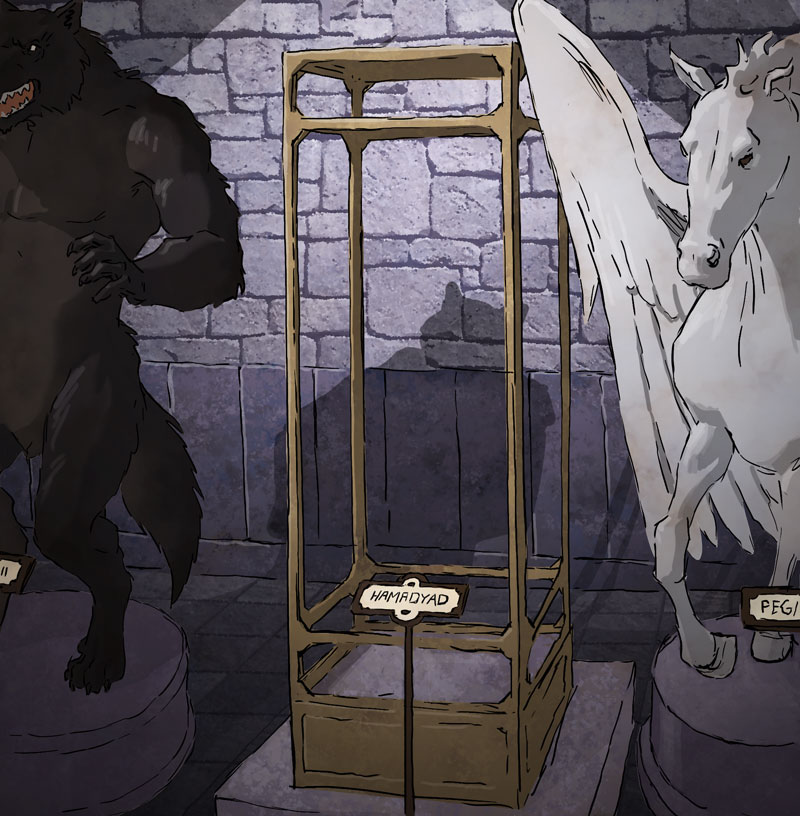
“…and the only necessity remaining will be the writing of songs.”
The King turned to smile at the talented young Minstrel, but Bryn was no longer there.
Fellow was an old horse, but he seemed to understand his master’s need for haste. Bryn was surprised by the animal’s capacity for speed. Did Fellow sense that the Hamadryad was in peril? As they raced over the rolling hillside, the castle of Ironhorn diminished behind them, along with Bryn’s chances of being a Court Minstrel.
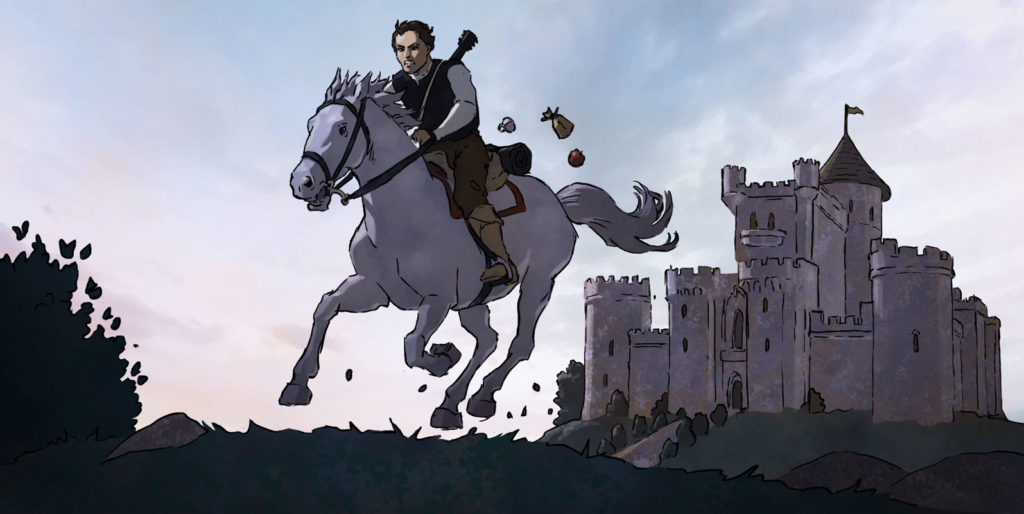
The tug of war inside Bryn was over. Only one chain remained, and it pulled him in the direction of Modesty. His best hope was to reach her before the Huntsmen did. The two of them could escape together, find another forest. If the Huntsmen had already captured her but she was still alive, the situation was more complicated. He had no martial training and had not been in a fistfight since he was eleven, and he lost that one to the Tinker’s son. What could one skinny lad of nineteen do against three burly men who killed things for a living? If they had already found her, but she was no longer alive – Bryn refused to contemplate that scenario.
“Where do you suppose she got the shirt?”
It might have been Malwyn who spoke. Bryn felt a tension in his stomach when he heard these words. The only light in the birch grove came from the three Huntsmen’s campfire. The Minstrel had left Fellow beyond the bend in the forest road, and he hoped his horse wouldn’t follow him. Bryn stepped through the darkened undergrowth on weak legs. He had saddle sores from making a two-day journey in a day and a night, and he ached from every part of his body.
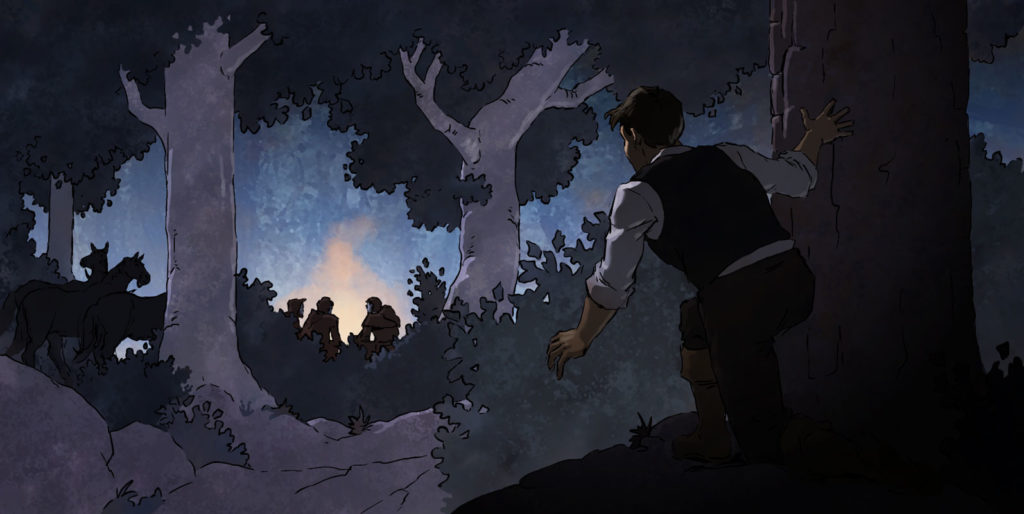
“Doubtless, she stole it from a traveler’s camp,” it was probably Mervyn responding.
“Are you both blind?” Madog asked. “It’s the shirt that minstrel wore the night we met him.”
Bryn was at the edge of the camp. The firelight cast expansive shadows of the Huntsmen across the grove. The draft horses were on the far side of the clearing, upwind from him.
“…he probably gave it to her.” Madog continued. “And was hiding her from us the whole time.”
“Not a lot of good it did in the end,” Malwyn said with a glance at the figure dangling from a large elm tree at the edge of the camp.
Bryn felt his heart go from a canter to a gallop when he saw Modesty’s limp form hanging from the rope. Leather bindings secured her wrists and ankles. There was no sign of breath in her body as it slowly rotated in the night breeze. When she was facing him, he leaned forward. Her eyes flashed open, and Bryn almost fell backward. She was alive! He put a finger to his pursed lips, motioning her to be quiet. She pursed her lips back at him accusingly as if to say, “YOU be quiet.” Of course, the Hamadryad could move through the wood in perfect silence, but Bryn – he was a village boy.
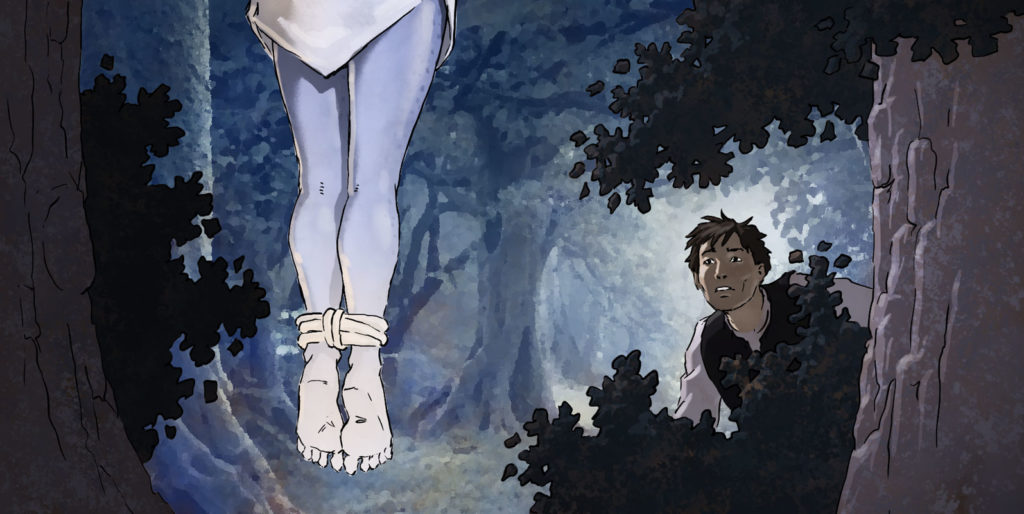
As Madog and his brothers busied themselves with their supper, the Minstrel slipped the knife from his belt and stepped halfway into the firelight. It was not a formidable knife since its primary function was whittling wood and slicing bread, but it was equal to the task of sawing through the straps between Modesty’s ankles. The knots around her wrists presented a more profound challenge. Even if he stepped fully into the light, he would not have been able to reach them.
“I told his High-and-Mightiness that we weren’t needing all them crossbows, chain mail, and chariot spikes,” Mervyn said with a mouthful of salted mutton. “‘A long pole with a noose on it is all I’ll need,’ I told him. And was I right, or was I right?”
Bryn motioned to Modesty that he would circle the camp and climb into the tree. She looked alarmed, glanced at the Huntsmen and back at Bryn, and shook her head. The Minstrel shrugged in reply. There was no other option.
“I admit,” said Madog. “I was expecting more of a fight from the likes of her.”
Bryn tip-toed to the elm tree. He was closer to the horses than he wished to be, but there was nothing for it.
“The question now is, can we get her back to Ironhorn alive,” mused Madog as he drank from a jug of Honey Mead.
The Minstrel slipped the knife between his teeth and prepared to climb. He quickly reconsidered, took the knife from his mouth, and put it back in its sheath.
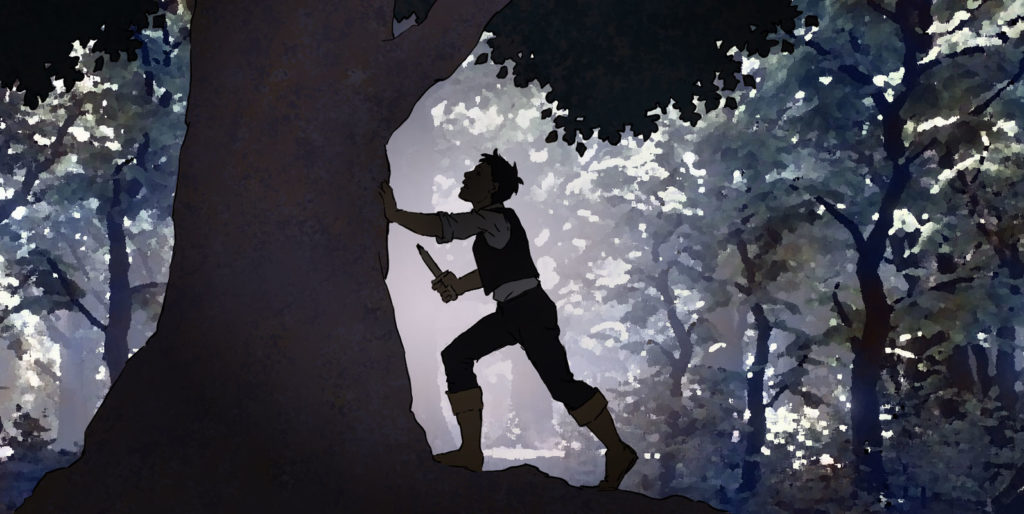
“You expect her to resist?” asked Malwyn.
“The King don’t think she will live long once we removed her from her trees.”
Mervyn wiped his mutton greased hands on his tunic. “She’ll still be fresh enough, I reckon.”
Modesty’s eyes surreptitiously followed the Minstrel’s progress up the trunk and out along the branch. He was in full view of the fire, but no one was looking up just now. The Huntsmen’s conversation turned to game and cockfights as Bryn reached the knotted ropes, redrew his knife, and commenced sawing.
Strand by strand, the rope gave way. If he had the foresight to sharpen the blade before he came, this escape would have gone faster, but the business of adventuring was new to him. All at once, the line snapped free. Modesty dropped to the ground without a sound, but Bryn’s knife slipped from his hand and fell after her.
“Look out,” he warned in a clenched whisper.
Modesty easily evaded the blade, which impaled itself in the ground next to her bare feet.
“Hey there!” Madog shouted, spitting mutton into the fire where it sizzled angrily. “She’s loose!”
They had lost the advantage of secrecy.
“Run, Modesty!” Bryn shouted, drawing attention to his location on the branch. The imperative was unnecessary as the Hamadryad had already vanished without rustling a leaf.
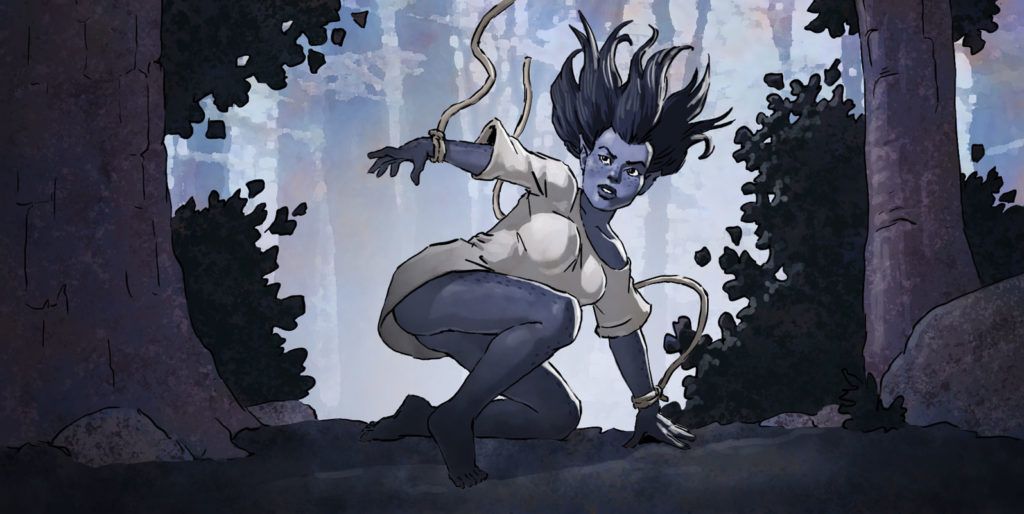
“Holy Hell!” roared Malwyn. “It’s the bloody singer.”
“You two find the girl,” Madog ordered. “I’ll get the Minstrel.”
Mervyn snatched up his long pole, and Malwyn took a crossbow. They rushed from camp in the general direction where they last saw the Hamadryad.
Bryn heard Madog coming for him, and his first thought was to climb higher. But he was too slow and the Huntsman too tall. The Minstrel felt his foot grabbed, and the next moment he was flailing through the air to land gracelessly on his back. The wind left his lungs. Madog was on top of him; one big hand pinned Bryn to the dirt.
“And after we shared bread with you! There’s gratitude!” the Huntsman spit. “That animal was our fortune.”
“She not an animal!” Bryn’s anger overcame his fear, and he kicked one of his legs up to catch Madog on his bearded chin. The impact was negligible to the Huntsman, who drew his hunting knife and placed it at the young man’s throat.
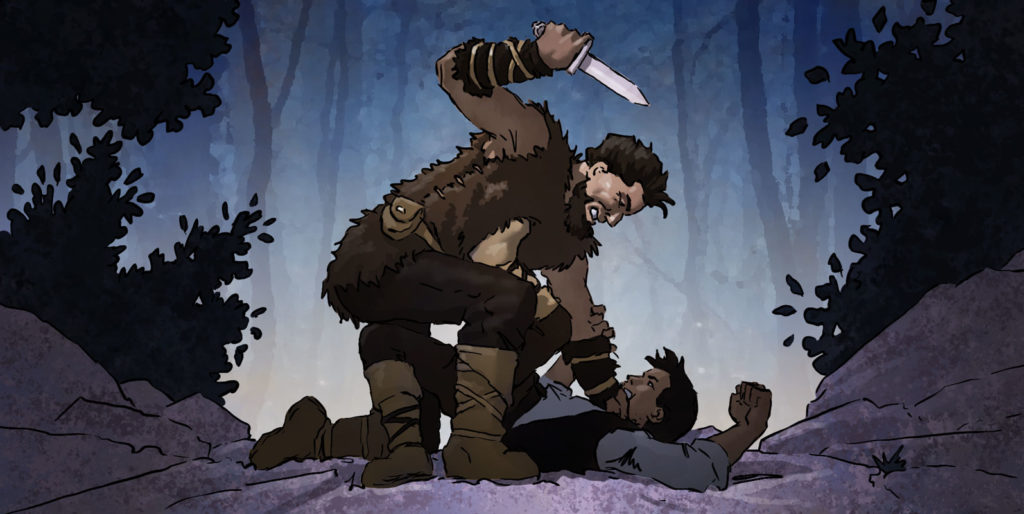
There was motion in the tree above. Modesty landed on the Huntsman’s back and gripped his knife-hand.
“I told you to run!” Bryn cried in alarm.
Madog pivoted in a crouch and slammed the Hamadryad to the forest floor.
“Boys!” He called to his brothers. “She’s here. She never left the camp.”
Madog lifted the knife to stab the Hamadryad. Bryn rolled free, grabbed a burning log from the fire, and crushed it across the back of the Huntsman’s head. It was a solid blow, and the big man pitched forward. Bryn had never knocked out a man before, and now he had no time to appreciate the accomplishment. He pulled Modesty to her feet just as the other two Huntsmen reappeared.
The horses stamped in alarm. Malwyn pointed the crossbow at Modesty, but Bryn stepped in front of her with his arms wide. The impact of the bolt hitting his shoulder lifted the Minstrel off his feet. He landed on the ground beside the girl that he had come to rescue.
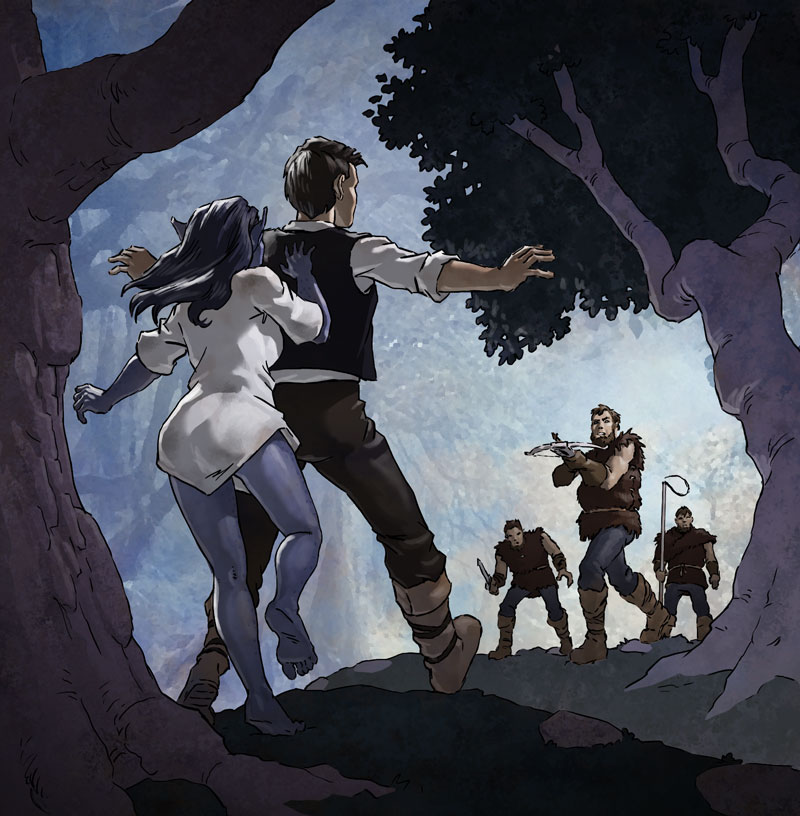
The crossbow is a formidable weapon, but it is slow to reload, and at this moment, it would be salient to observe the danger that comes from having insufficient knowledge of your prey. For it was accurate that the Hamadryads would not defend themselves in the face of their own demise, but their ability to protect the things they love, be they trees or Minstrels, was terrifying.
From his position on the ground, Bryn saw Modesty’s eyes glow an aggressive red. She screamed as she dropped to her knees and clawed her fingers into the earth. The ground rippled outward from her hands, and the trees replied. Roots erupted from the dirt. Branches descended from above. Before Malwyn could replace the bolt on his weapon, he felt sharp wood pierce his chest to find his heart. Mervyn dropped his long pole as a branch wrapped his throat and gave his neck a decisive snap. Roots enveloped Madog’s unconscious form and crushed his spine.
Before Modesty finished her scream, the Three Huntsmen of Craggulch were dead. The echo of destruction rumbled through the Old Badger Wood, and every forest creature heard it.
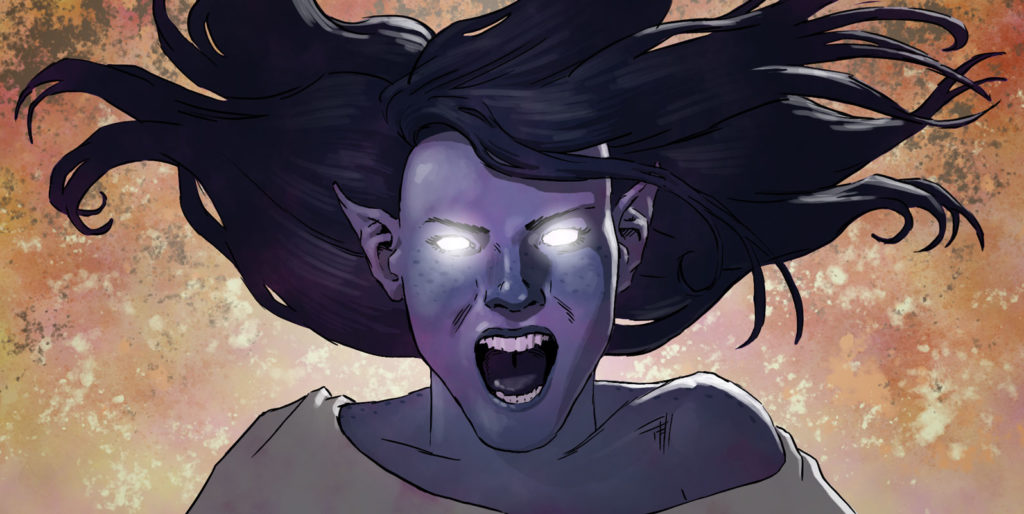
Bryn looked up at the Hamadryad as her rage abated, and the red glow left her eyes.
“Modesty?”
His mind was dazed and his body in shock.
“Quiet,” the Hamadryad said. “Rollover.”
She gripped him by his uninjured shoulder and helped him onto his stomach.
“Did you just speak?” The pain from his wound was asserting itself. Modesty held him down with a knee on his back. The bolt was protruding from his shoulder, and she took hold of it just below the barbed tip.
“Hold still,” she said and yanked the bolt free by pulling it through from the other side.
“I’m sorry I didn’t come back sooner,” Bryn said as the Hamadryad dressed his wound with thin strips of bark over a poultice of meadowsweet, silverweed, mistletoe, and several herbs that were unknown to the Minstrel. The dressing eased his pain, but the touch of her hands seemed to have the most salubrious effect upon his wound. “None of this would have happened.”
“But you did come back,” Modesty replied.
“When did you learn to speak?” He had to know. “And why didn’t you do it before?”
“My kind is slow to trust,” she said and kissed him gently on the forehead. “If you stay with me, I can teach you many tongues. Would you like to sing in the language of the trees? You could serenade the river reeds or hum rhythms that only the stones can hear? If you know how to ask it politely, the wind will carry your melodies to the far corners of the world. Come with me, back to Whispering Hollow, where no mortal man can find us if we don’t choose to let him in. Bring your lute and your horse. I will answer all of your questions.”
“Do you have a real name?”
“Many,” she kissed his mouth. “But none that I like more than the one you gave me.”
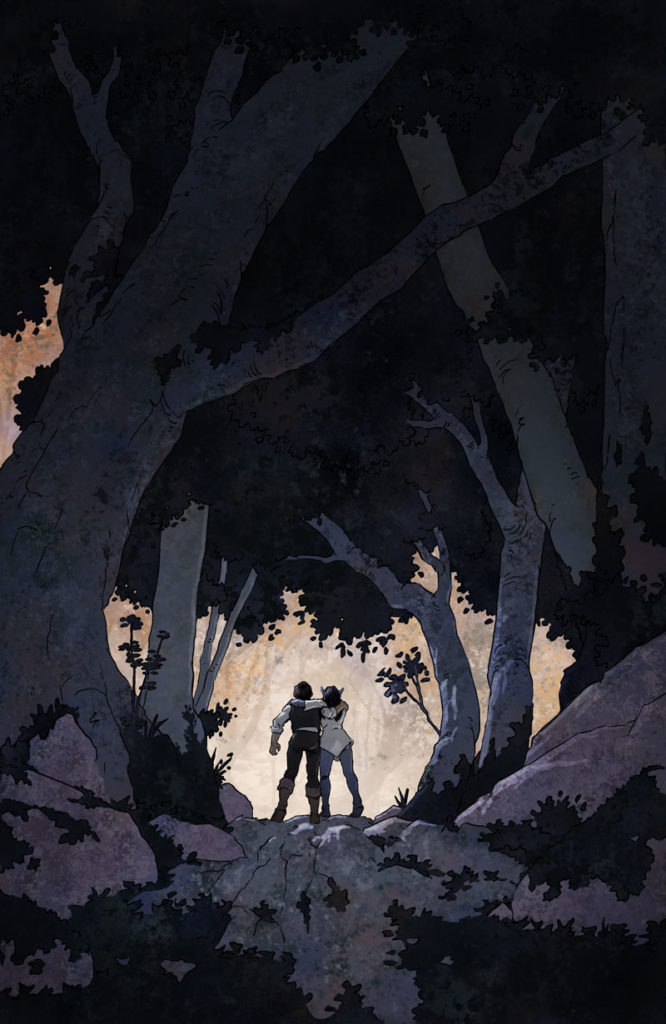
EPILOGUE
“A fine story and well told,” the Candle Maker said as he pulled on his pipe. “Except for the obvious discrepancy.”
The Storyteller had shouldered her lute upon its strap and was collecting her coins. The caravan of merchants began to abandon their campfire and wander back to their wagons. They were passing through Old Badger Woods to the New Conquest Market when they met the young woman. She offered to sing for them and tell them a tale. It was unusual for a traveling bard to be a young lady. She carried no weapons, and she may have been pretty, it was hard to see since she kept her hood on the whole evening. Someone could have easily robbed her — or worse — if it were not for the wolf.
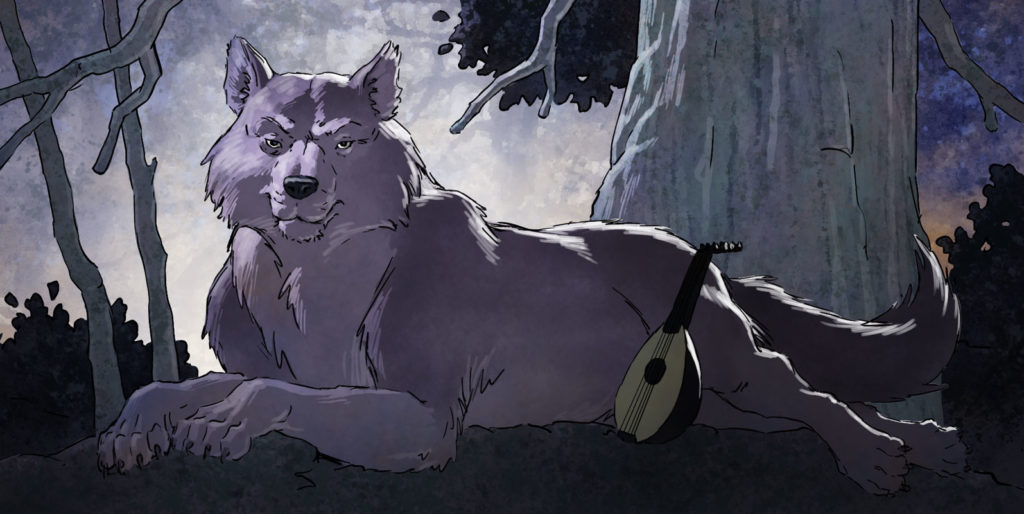
“What discrepancy?” asked the Storyteller.
They were interrupted by the Milliner. “How much for a kiss?” he asked, holding a coin in one hand and a mug of Goodale in the other.
The wolf sitting on the ground next to the Storyteller gave a low grumble inside its cavernous chest. Its upper lip raised just enough to show a hint of teeth. It was sufficient to motivate the Milliner to drop his coin in the girl’s cup and stagger away to search for his cot.
“What discrepancy,” she repeated in a sweet voice.
“You say the story is true,” explained the Candle Maker. “And that the Minstrel followed the Hamadryad back to Whispering Hollow and was never seen again by the eyes of mortal men.”
“Aye,” the Storyteller confirmed.
“So, how do you know what transpired? The Huntsmen were dead, and there was no one else to pass on the story.”
“An excellent observation,” she replied. She patted the wolf’s haunches, letting it know that it was time to leave. The beast stirred and shook its great bulk. “You see, the Hamadryad had been the last of her kind. But her union with Bryn ensured that magic would not die in the world. Not yet at least –”
Here the young lady pulled back her hood so that the Candle Maker might see her lightly spotted blue skin and gracefully pointed ears.
“– for I was relating the tale of how my mother met my father.”
A moment later, both the girl and the wolf had vanished into the forest.
By Doug Lefler
Bryn Oakkart was listening to the music of the stream at the center of Whispering Hollow when he saw her for the first time. Her eyes were so attentive and her smile so mysterious that he forgave her for not being human.
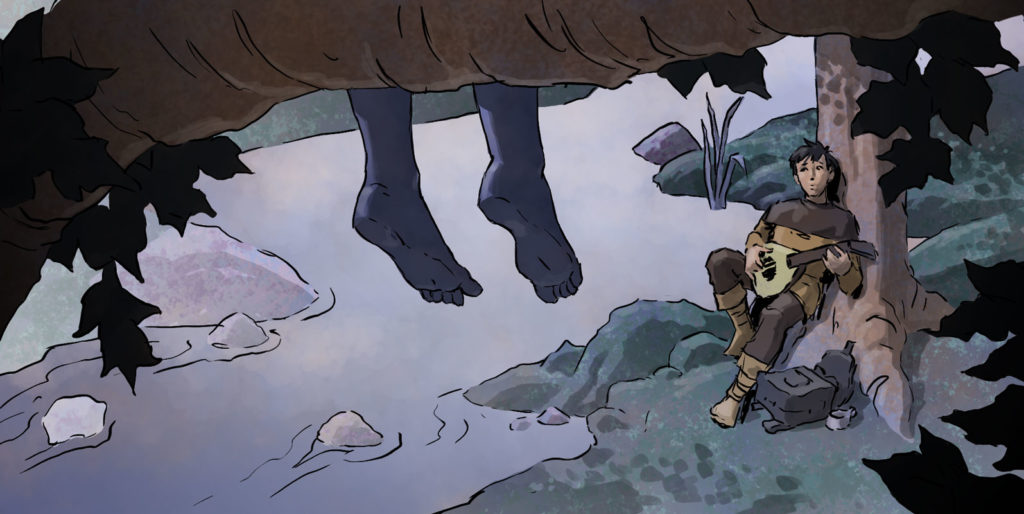
At the age of sixteen, Bryn had fallen in love. Not with Aila, the minister’s daughter, as his mother had hoped, but with the lute. All thoughts of a career in the clergy vanished in a single day. The instrument came from his grandfather, who had given up on music in his youth and allowed the lute to languish, unused for the better part of five decades.
Bryn’s lute was not one of those modern monstrosities that had grown to enormous proportions in hopes of overpowering a crowded music hall. It was a proper lute with seven lines of strings that emerged from its base, angled gently over the bridge to race straight and sure across the soundboard, and up the neck where all fourteen strings made an abrupt and well-choreographed turn at the pegboard. Byrn’s natural talent, quick ear, and nimble fingers had the added benefit of an excellent teacher. Master Harlyn Owler had once been the First Lutenist at the Court of Ridge Rock beyond the Great Meadows. Harlyn had retired to Bryn’s small fishing village, hoping that the sea air would save his lungs.
They did not, and he died of consumption two years later, but not before imparting the basics of the instrument and a passion for music to his talented student.
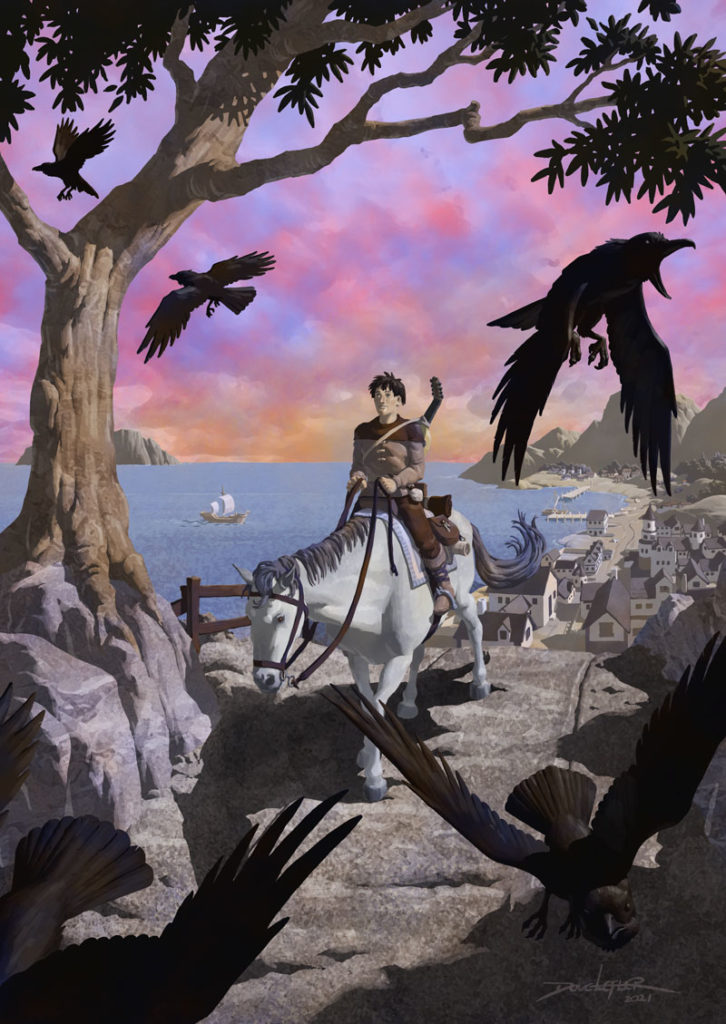
At eighteen, Bryn’s indulgent father gave him an old horse named Fellow, and with this gentle beast, the young man began a wandering life. He enjoyed some popularity on the Western Coast, from Recollection Bay to the vibrant seaport of New Conquest. By nineteen he had learned all the favorite ballads, love songs, and comic ditties of his day and had begun writing his own. To this end, he would often venture off the forest road seeking a quiet spot to compose. Thus, fate and a liberal amount of artistic ambition landed him in the seldom visited Whispering Hollow of Old Badger Woods.
Bryn had heard stories of the Hamadryads but did not believe that there was any left on this side of the Colliding Mountains, but with her large black eyes, gracefully pointed ears, and lightly spotted blue skin, the girl could be nothing else.
“Hello,” Bryn said in his most soothing voice. “How long have you been watching me?”
The creature looked down on him and blinked.
“Can you understand me?” Bryn asked.
She cocked her head curiously but made no reply.
“Master Owler said that music is the universal language. Let me play something or you.”
The Hamadryad made no protest, so Bryn rested his grandfather’s lute on his lap and began a slow melody.
The girl in the tree had been crouching like a compressed spring, but now she settled into a comfortable position. Bryn played for her the sweetest songs in his repertoire, and the Hamadryad lingered until the sun went down. When he finally stopped, the creature rewarded him with a tantalizing smile.
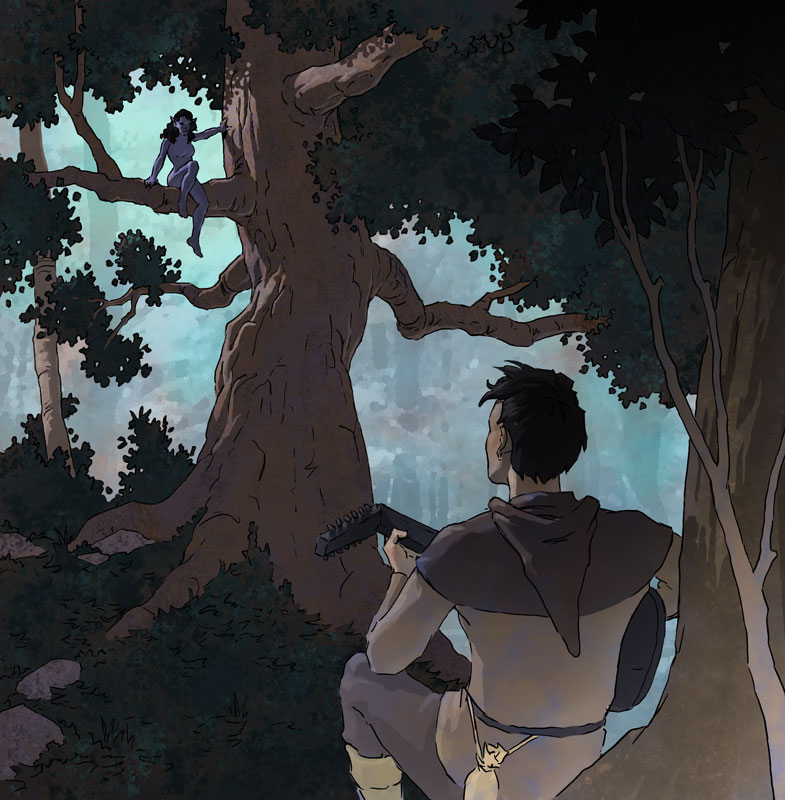
“If you don’t mind,” Bryn said gently, “I am going to stand now. I’ve been sitting for hours, and my right leg has fallen asleep.”
He carefully set aside his lute and uncrossed his legs.
“Don’t be alarmed. I won’t approach your tree.”
She exhibited no alarm as she dangled her naked legs from the crook of the oak branch, but by the time Bryn had his feet underneath him and was stretching his back, the branch was empty. Her exit had stirred not a leaf. Not a sound betrayed her movement.
The hollow was quiet except for the music of the stream.
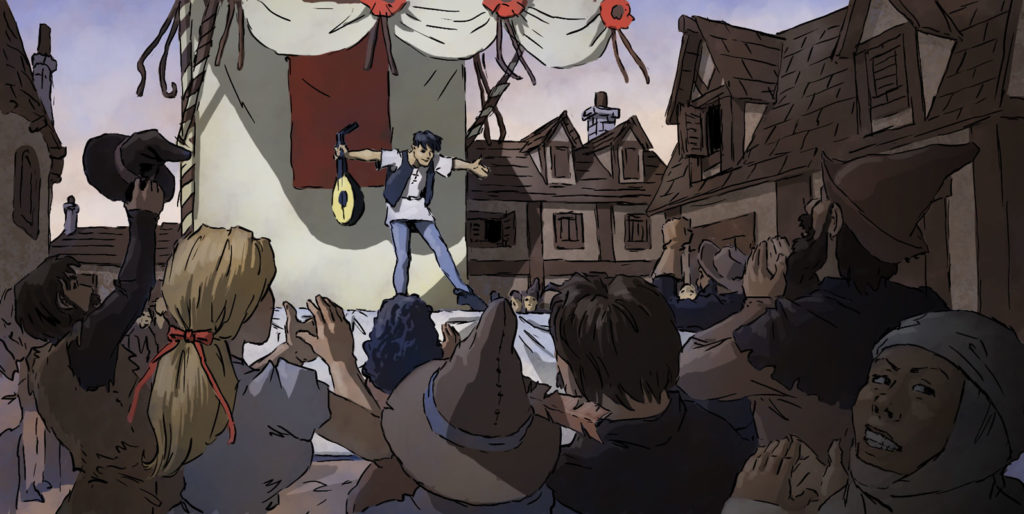
“Lady of the Trees” was the talk of the Summer Festival at New Conquest that year. He had intended to spend three days at the festival, but the coin and applause kept him there for two weeks. The Innkeeper’s daughter at the Broken Wheel was much more polite to him the day after she attended one of his performances, and he was able to afford a new saddle for Fellow.
“Although lovely to see, the Hamadryads were simple creatures,” Mr. Drake, the bookseller, read from a leather-bound tome. “Incapable of articulate speech, but proficient climbers by virtue of their long slender arms and prehensile tails –”
“Tails, you say?” interrupted Bryn. It was musty inside the bookseller’s shop, although the smell might have been coming from Mr. Drake himself. The Allistyr Drake Book Emporium was his last stop before leaving New Conquest. Bryn did not remember a tail on the Hamadryad, but she had been some distance up a tree.
Mr. Drake lifted his eyes over his spectacles to glanced sharply at the young man. “May I continue?”
“Apologies,” Bryn replied.
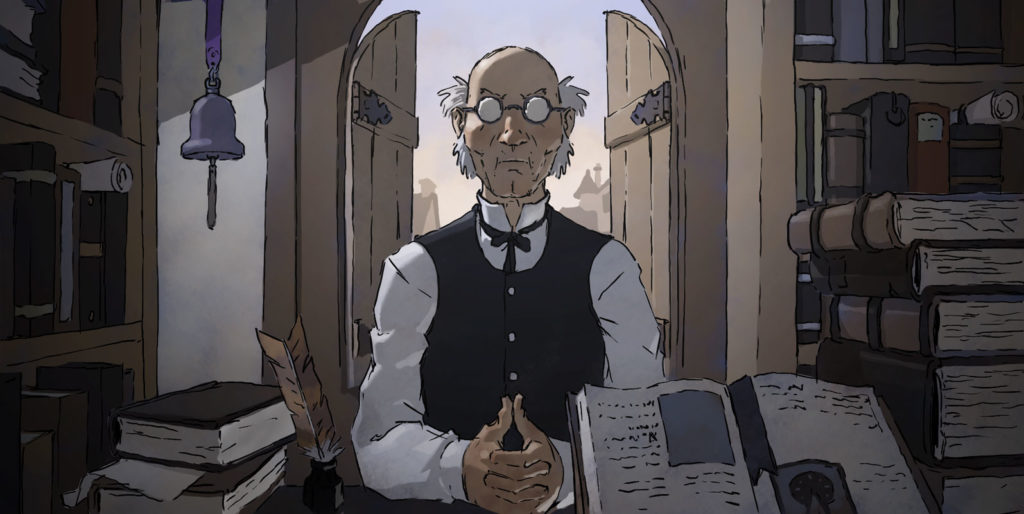
“These forest spirits were the most passive creatures of the Faerie Realm,” the bookseller’s bony index finger followed the words on the mottled parchment. “They would not raise a hand to defend themselves even in the face of their death, which is likely the reason for their eventual extinction.”
“How much for the book?”
Mr. Drake displayed a condescending smile.
“More than a street musician can afford, I’m afraid. Books,” he insisted, “are meant for the elite. This particular volume represents two years of impeccable scribe work by the monks of Red Rook Abbey.”
Bryn knew that his next question would likely get him expelled from the shop, but it was time to leave, and Mr. Drake was annoying.
“How much just to buy the pages on the Hamadryad?”
Bryn had left Whispering Hollow with the determination that he would return. To that end, he had carefully marked the path back to the forest road. But as he retraced his journey through Old Badger Woods, those markers were nowhere to be seen.
“That’s curious,” he said to his horse. Each marker consisted of three stacked stones. He might have missed one or two of these stacks, but not all. “Do you suppose someone moved them?”
Fellow snorted but offered no opinion.
Would a passive and unintelligent creature like the Hamadryad do such a thing? Bryn frowned. A thought intruded that maybe the forest girl did not want to hear him play again, but his ego quickly dismissed that as implausible. When he closed his eyes and remained still, he thought he could discern the Whispering Hollow stream’s signature music, but it was impossible to identify in which direction it lay.
Having no other option, he decided to play his lute in the middle of a quiet grove and hope that the Hamadryad would come to him.
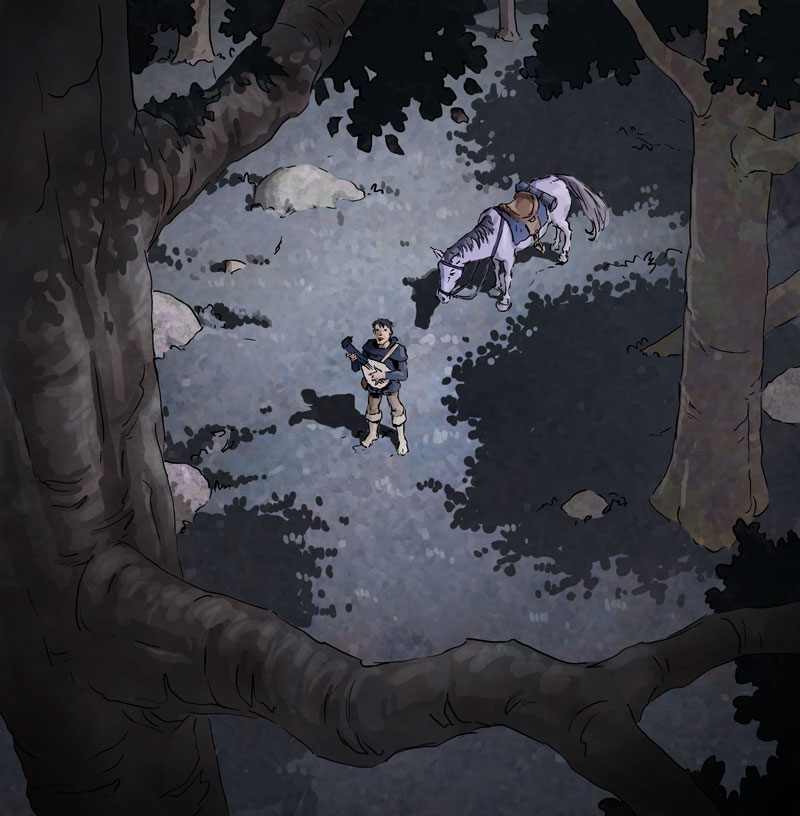
The sun was sinking, Bryn’s fingers were numb, and he had exhausted all of the songs that pleased the Hamadryad on their first meeting. There was no sign of her. Bryn had saved the best for last. As the light was fading, he began “The Lady of the Trees.” Bryn had been eager to play it for her ever since he composed it. She must be listening now, he thought. She must.
As he strummed the final chord, Fellow tossed his head and whinnied.
“What is it, boy?” Bryn was expectant. “Is she here?”
The horse fidgetted and pawed the turf. Bryn could hear something approach. He knew that it was not his Hamadryad, primarily because he heard it coming. Through the birch trees, he could discern three stout men riding three draft horses.
There was no logic in fleeing. Bryn had previously removed his new saddle from Fellow’s back, but his old horse could not have outdistanced those hardy steads even if he was packed and ready to leave. So instead, he stood with his lute in one hand and bowed graciously to the intruders.
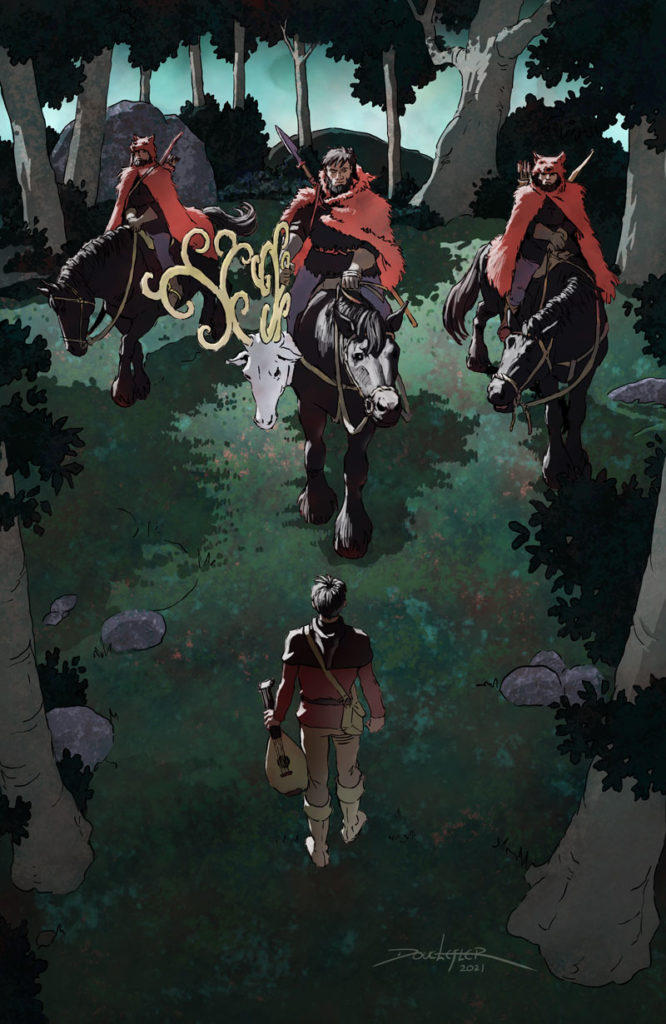
“Greetings, gentlemen. Welcome to my humble camp,” he said to the men. They were wearing woodsmen garb.
One of them nodded politely to the young musician.
“That was an able bit of minstrelling just now,” he offered in a deep voice. “Are you familiar with that song Malwyn?”
He turned to the bearded man on his left.
“It’s new to me. Mervyn?”
The third man shook his head. “Very pretty,” he offered. “What’s it called?”
Bryn was hesitant to answer, but he had been singing this song for weeks; it was now public knowledge, and other musicians had picked it up and were spreading it from tavern to tavern. “‘The Lady of the Trees’,” he answered.
“I am Madog,” announced the first man. “And we are –”
“The Three Huntsmen of Craggulch,” interjected Bryn, for they could be none other.
“You know of us?” Malwyn asked.
“From the song ‘The Gryphon of Calamity,'” Bryn replied with another bow. “Written, if memory serves me, by the Minstrel to the Court of King Edryd. I am honored to make your acquaintance.”
“The honor is ours,” said Madog as he untied a complex object that hung from his saddlebag. In the dark, Bryn could not discern what the thing was until it thudded to the ground in front of him. He looked down on the head of a magnificent stag, with shaggy red and blue fur and extravagantly curled alters of iridescent gold. The eyes stared blankly, and the tongue protruded from the mouth in an undignified.
The three Huntsmen of Craggulch dismounted.
“If you will permit us to share your camp,” said Madog as they unpacked their gear, “we will gladly share our bread. And there will be five copper pieces for you if you’ll play for us after supper.”
“An appreciative audience is all the payment I require,” lied Bryn. Seeing the stag’s head had cost him his appetite.
“Nevertheless, the copper pieces are yours to take,” insisted Madog, and he counted out five of them onto a flat stone in the middle of the camp.
After supper, Bryn played a medley of tranquil ballads and soothing lullabies. He put his heart into the performance, and soon the huntsmen had dropped into a deep slumber. Bryn gathered his belongings and led his horse out of the camp.
He did not take the five copper pieces.
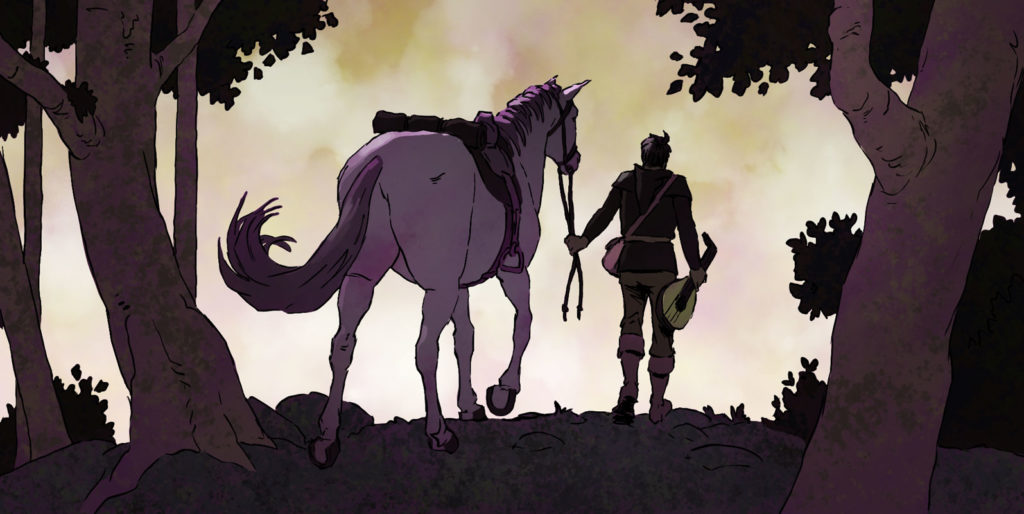
Two months had elapsed before Bryn Okkart passed through the Old Badger Woods again. He did not pause to play his lute in the birch grove or seek the path to Whispering Hollow. If the Hamadryad was still in the forest, she should stay as far away from humans as possible, including those who sang songs that might draw attention to her. Bryn had not performed “Lady of the Trees” since his encounter with the Huntsmen. To his consternation, the song’s popularity spread without his help.
Some distance beyond the grove, Bryn reined Fellow off the path and found a quiet stream. It had been a long ride from Bailly Ridge, and the young man was happy to unlace his boots, pull off his shirt and trousers, and bathe in the clear water. The stream was refreshing. Its current tumbled over the rounded stones to make a hauntingly familiar melody. Bryn found himself pondering how fast the world was changing. Mystic Dire Wolves once hunted Unicorns through these woods. In his grandfather’s time, meetings with the Fair Folk were uncommon but not astonishing. These days an encounter like the one he had with the tree spirit could only be described as an aberration. Magic was leaving the world.
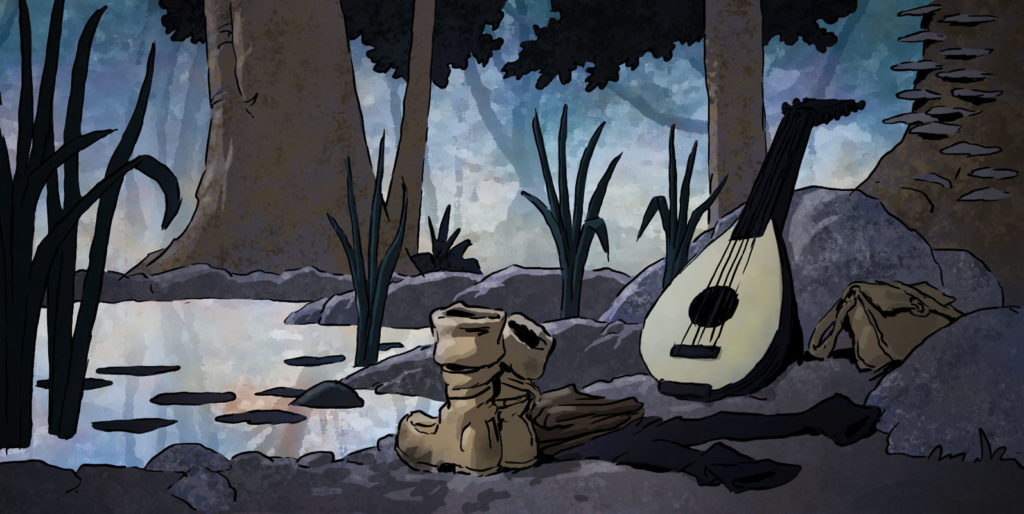
The stream was lulling Bryn into a dream. Falling asleep under these conditions could have tragic consequences, so Bryn shook himself and rose from the water. His bare feet made their way across the smooth river stones until he was back on the bank.
“What’s this?” Byrn asked. He looked at his horse. He looked about the clearing and then back at the ground. “Where are my clothes?” And then, with rising alarm, “Where is my lute?”
He searched the clearing, bruising his bare feet on rocks and sticks.
“Someone took all of my things, and you just stood there?” Bryn demanded of his horse. “You didn’t make a sound?” Fellow shook his mane and looked in the direction of an elm tree. Bryn followed his gaze.
“Oh!” he exclaimed.
Eighteen feet above him was the Hamadryad dangling her bare legs from the crook of a branch. She was wearing Bryn’s shirt; his boots were next to her, his lute rested on her lap, and she was examining his trousers with fascination.
“Hello again,” Bryn said, for he was sure this was the same creature he had met before. “Could I please have my lute back –?” and suddenly remembering that he was naked, “and my trousers?”
The Hamadryad paid him no notice as she draped his trousers over the branch and picked up the lute. She held it to her ear as if she expected music to come from it. Frustrated by the silence, she shook the instrument.
“Please be careful with that,” the young man pleaded.
The Hamadryad took the lute by its handle and knocked it against the tree trunk. It was making a noise, but not the sound she wanted.
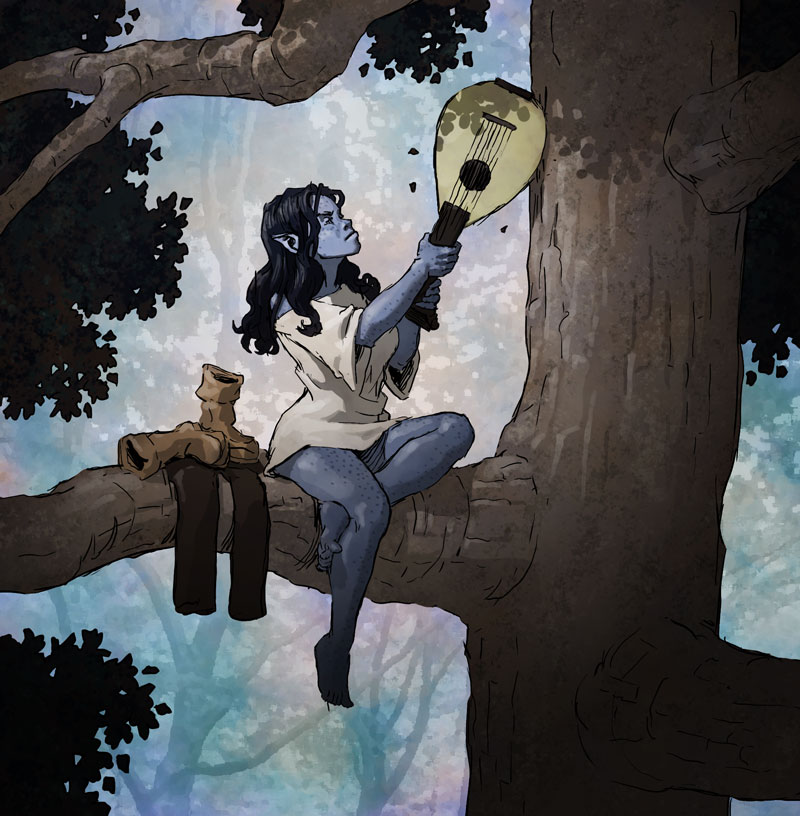
“Don’t! Please! That’s my livelihood!” Bryn insisted. Panic was rising in his stomach. “If you give it back to me,” he said as calmly as he could manage, “I will play it for you.”
He nodded, smiled, and held out his hands for the instrument.
The Hamadryad looked down at him, cocked her head, and held the lute toward him.
“Yes,” Bryn nodded more emphatically. “If you,” he pointed at her, “give it back to me,” gesturing to himself, “I will play it for you,” and he mimed the action of strumming.
The girl in the tree shrugged and let the lute drop. Bryn lunged forward and caught the instrument, stubbing the big toe of his right foot on a root of the elm tree. He danced about in pain, which seemed to amuse the Hamadryad. She mimed the action of strumming the instrument back at him to remind Bryn of his promise.
“Alright,” Bryn sat on a log and positioned the lute on his lap. “Just one song, and then I need my trousers back.”
The song seemed to delight the tree spirit more than the first time he played for her. Perhaps the three months’ absence of music had made her want it more. When he finished, she swung her feet in delight and tossed him one of his boots.
“No, not my boots.” Bryn caught himself and smiled at her again. “Well, I need my boots too. And I think I see how this will play out.”
Another song later, and the second boot dropped.
He played “Lady of the Trees” for her, and she gave him back his pants. Bryn dressed quickly, but by the time he finished lacing his boots, the elm tree branch was vacant. He turned to find the Hamadryad stood on the ground ten feet away. She was still wearing his shirt, and she placed a hand on the fabric to clutched it possessively.
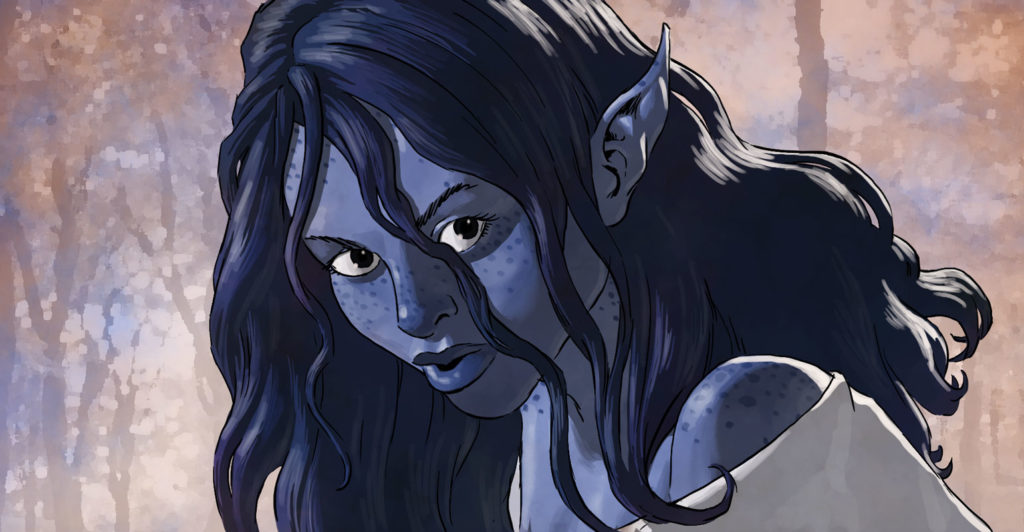
“You can keep it,” He had another shirt in his rucksack that he usually saved for his performances. Bryne grinned at her. “You should have something to protect your modesty.”
“Modesty,” the Hamadryad said.
“You can speak!” Byrne exclaimed.
“Modesty,” she repeated.
“I’m Bryne Oakkart. Do you have a name?”
“Modesty.”
“Are you going to keep saying that word back to me?”
“Bryne,” she said, pointing at him. “Modesty,” she placed her hand on her chest.
“Very well. Modesty is what I’ll call you.”
The Hamadryad looked down at the shirt she was wearing and made a twirl. It hung on her like a short dress, but Bryn could see most of her bare bottom.
“No tail,” he asserted. “So much for the impeccable work of the Scribes of Red Rook Abbey.”
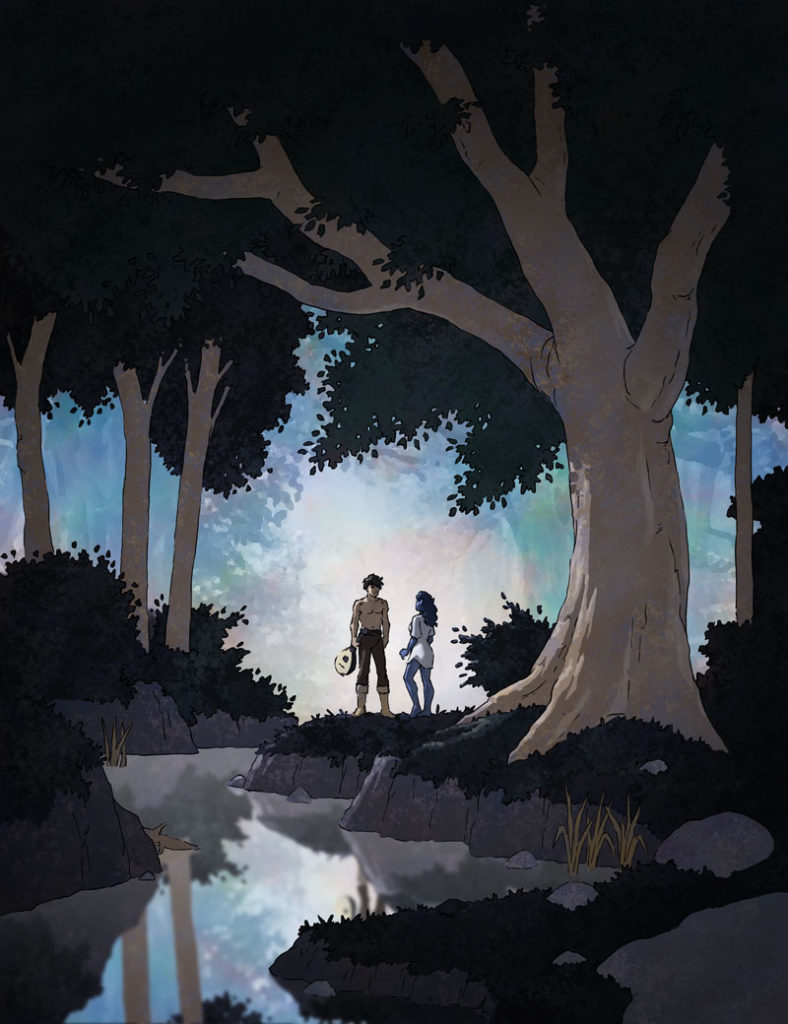
When Bryn woke the next morning, the Hamadryad, who he now called Modesty, was lying next to him. Nature had taken its course the night before as you might expect with a boy and a girl alone in a forest. Bryn realized that inter-species coupling would be a thing frowned upon by polite society, but when he saw her face in the morning light, he thought, “perhaps I’ll stay in the forest one more day.”
The next morning when she was still lying beside him, Bryn thought, “I can afford to stay one week.”
A month passed before the Minstrel packed his saddlebag again. He was surprised at his reluctance to leave Old Badger Wood, but he had agreed to perform at the Festival of Enlightenment in Ironhorn. To neglect his commitments would be a mark against his growing reputation. Modesty walked with him to the edge of the forest but would not pass beyond the tree line.
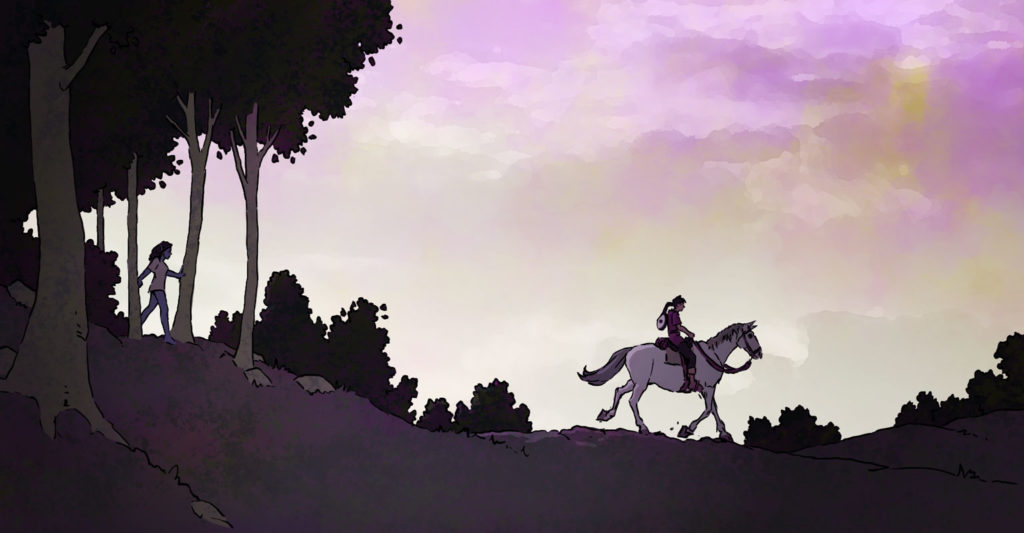
“I will be back in one week,” Bryn promised her. Modesty placed a hand over her heart, and Bryn answered with the same gesture.
Read Part Two of COURTSHIP IN THE FOREST OF EXTINCTION.
by Doug Lefler
“They’re bringing Frank Frazetta around for a tour!” my co-worker informed me. I was at the drawing board in my cramped office. Indirect light filtered through my window that faced the courtyard of our building. “But we’re not supposed to ask for his autograph.”
“Excuse me?” I asked.
“The boss thinks it would be unprofessional.” My co-worker slumped under the weight of this mandate.
“Go away,” I told him. “You and I never had this conversation.”
I wrote and illustrated for a small production company that shared a floor with a Hollywood casting agency. Outside my window, people frequently gathered in types. These occurrences were more bizarre than it sounds. We don’t usually see twenty short, stout Italian bakers, fifteen Asian American police officers, or thirty middle-aged, balding biology teachers sitting together while trying to ignore one another. In 1981 this casting agency was working on FIRE AND ICE. On my first day in that building, I arrived to find the courtyard filled by twenty voluptuous, dark-haired, almond-eyed women in string bikinis. They were auditioning to be Frazetta girls.
I had spent the last four years working in Disney Feature Animation, and before that, in the insular environment of art school. So as I absorbed the spectacle now before me, I thought: “Is this what it’s like in the outside world?”
Several months later, I was in my office early when I heard voices coming down the corridor. Three men appeared outside my office window. One of them was Dennis Gallegos, the casting agency owner who would become a producer on FIRE AND ICE. The second was Ralph Bakshi, the film’s director. He was the tallest and the loudest of the group, and he stopped abruptly to look at the illustrations on my walls.
“Jesus Christ! What’s this?” Bakshi demanded.
Dennis replied, “It’s a film project that these people are developing.” None of them noticed me sitting behind my drawing board.
“Looks good enough to steal,” Bakshi pronounced before he and the casting agent continued on their way.
The third man, shorter, older, and significantly more fit than the other two, lingered a few moments to study my art. It was Frank Frazetta.
“What medium do you use?” Frazetta asked me when he stopped by my office later in the day.
“Pastel,” I answered. “Only because it’s fast.”
He smiled. “I paint in mud.”
We were not alone. The casting agent was there with my boss (the two of them were friends) and several of my co-workers. I wasted no time in taking out my copy of The Fantastic Art of Frank Frazetta 1 and asked if the artist would sign it. It fascinated me to see that Frazetta wrote the inscription, but he sketched his signature, and you could see when he switched from one mode to the other.
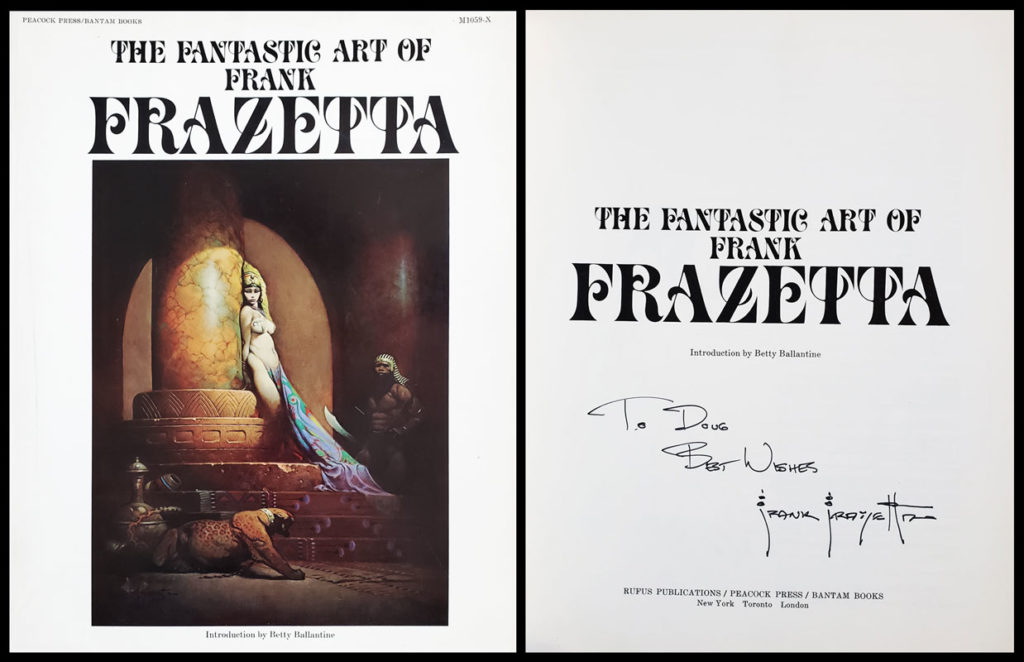
I imagine my boss was annoyed, but I feigned innocents and avoided eye contact. Finally, when he saw how gracious Frazetta was to an adoring fan, my boss turned to the rest of the staff crowded in the doorway.
“Alright, get your books.”
None of us knew in advance Frazetta was coming, but it wasn’t surprising that we all had copies of his book in our offices. In the early 80s, everyone in my business did. After signing all of them, Frazetta took one last look at my wall of illustrations.
“How old are you?” he asked.
“Twenty-four,” I told him.
He nodded and said, “you’ll make it.”
The Mysterious Passengers
“Inform your Mistress that this will not stand.”
The surf was teasing the launch’s stern while three Krimsian Guards waited in the sand near the vessel’s bow. The sky and the beach were white, with sea birds attracted by the novelty of humans on their shores.
“You have been paid in full for your services,” Syisha did not want to prolong this parting for fear that they would all lose their nerve. “Please cast off before you miss your rendezvous.”
“We are not interested in further profit,” insisted Rowl, the Captain of the Krimsian Guard. “But our reputations would suffer if we left clients to face the legendary perils of Disiri Island alone. We understand you seek something beyond these cliffs, at the very heart of the Three Rings.”
“It is not the island that endangers you,” the men turned to face Lady Nacia Oriandra. She was covered head to toe in her purple robes, the color of death. The hint of her eyes was visible beneath the shade of her hood. These were the first words she had ever spoken to them. “It is I.”
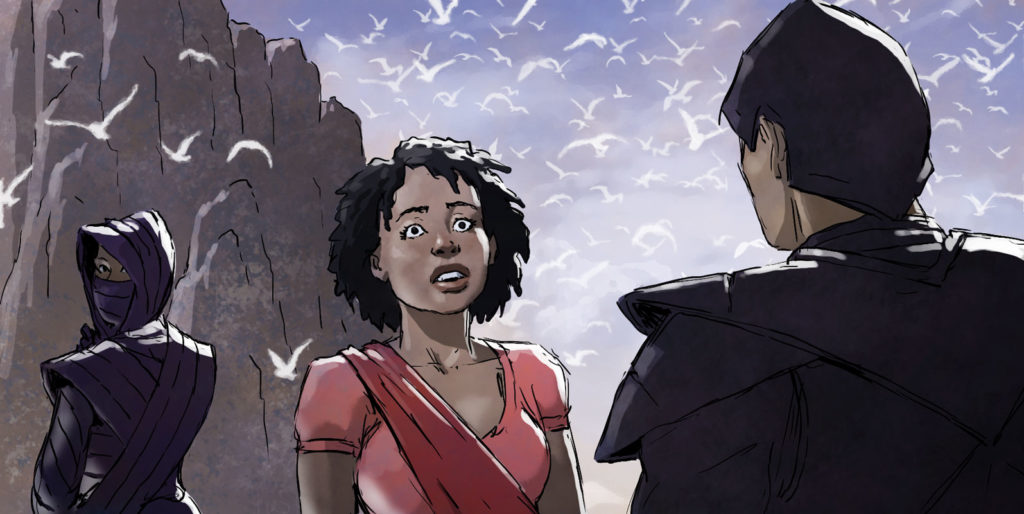
There was a raucous squawking among the gulls. A single raven, the color of midnight, had appeared. The other birds scattered to avoid it. Syisha, Song, and Jewell circled the Lady of Oriandra.
“If you love life,” Syisha shouted to the men. “Leave while you can!”
The squawking escalated into a cacophony as the seabirds took flight. Two more ravens had inexplicably joined the first. Rowl’s companions, Pike and Cort, fell into position flanking their Captain, hands tight on the hilts of sabers. Now there were five, seven, a score of the northern birds incongruously gathered on this tropical beach. They circled in tight formation above a rock at the foot of the Disiri cliffs, coalesced into a chaotic mass that resolved into the shape of a tall man. His robes, the color of midnight, remained a chaotic silhouette, the outline of which was occasionally interrupted by the flutter of a black wing.
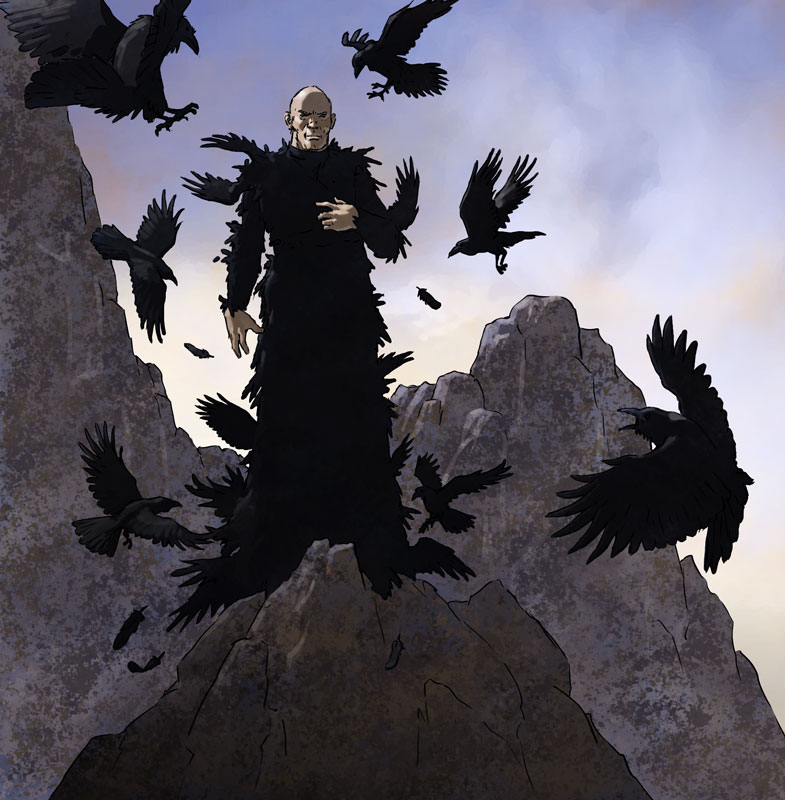
Three sabers sang with the reverberation of tempered steel drawn from scabbards.
“Greetings, Milady,” said Cagi Nor, the Nightling Thaumaturge. His voice was surprisingly mundane, like that of a money lender. “Congratulations. Your little party has survived many challenges to reach this most obscure of islands.”
“Stand down!” Nacia shouted to the Krimsians. She faced the Thaumaturge. “Be merciful, Cagi. Let these men go. They have earned their lives.”
“But Milady,” replied the tall man. “After braving so much for you, don’t they deserve to see your face?” Cagi Nor gave a wave of the hand as if he were brushing lint from a hat. Nacia’s hood erupted in a cloud of purple butterflies that flitted into the air.
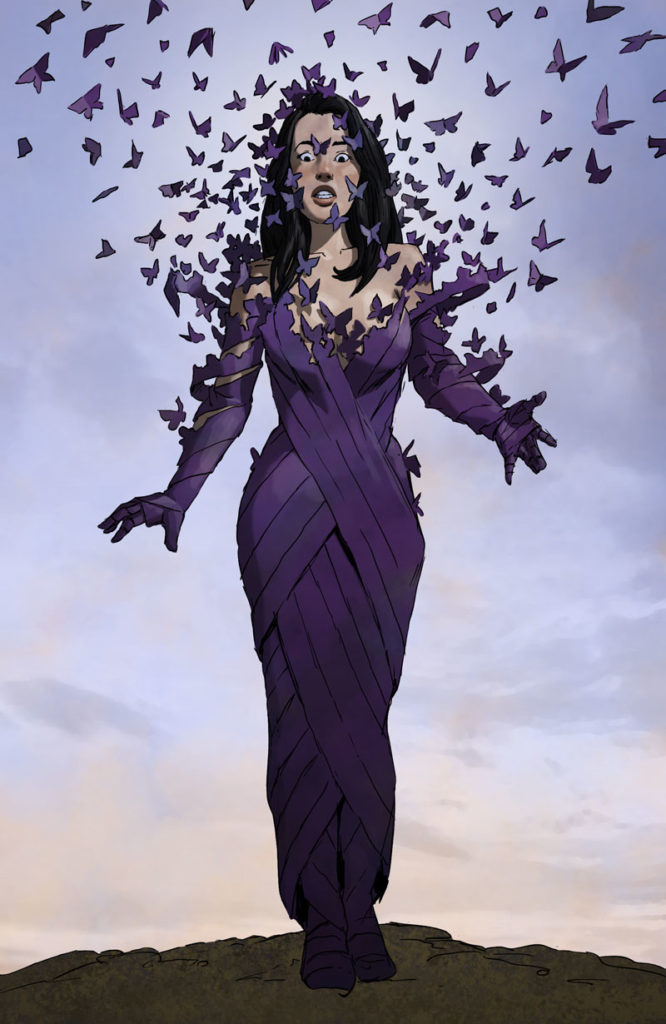
The Lady of Oriandra was as slender as her three companions. Her face was delicately proportioned and symmetrical, and yet at the sight of her, Pike, who was standing closet, dropped his sword and moved forward with arms outstretched.
He advanced three steps before his head was separated from his shoulders by the Captain of the Guard. Rowl was Pike’s brother, but the thought of another man wanting Nacia was suddenly unbearable to him. Before Rowl could take his brother’s place, he felt Cort’s blade slice open his back on its first stroke and hamstring his lower legs on its second. Then, as the Captain fell, he instinctively pivoted and buried his saber in Cort’s heart.
The three bodies landed in the sand within moments of each other.
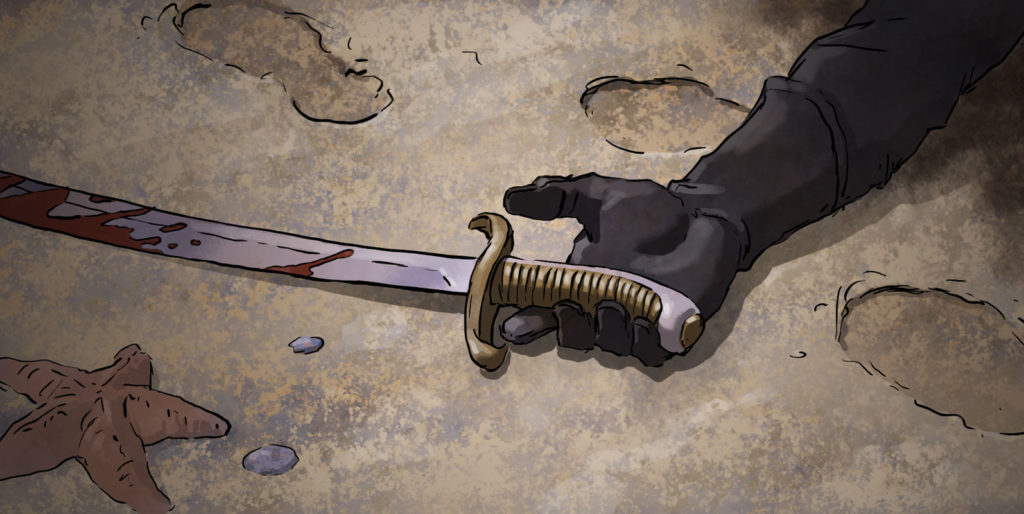
A wail of anguish escaped Nacia as the purple butterflies settled back into the fabric draped from her shoulders. Jewell dropped to her knees and covered her eyes.
Song stepped up to Nacia and touched her arm. “Milady, Rowl still lives.”
The Captain lay on his back while the blood was abandoning his body to mingle with the sand.
“We should spare him this misery,” said Syisha as she picked up a saber. “Does anyone know how to use one of these?”
“I have trained with ceremonial swords,” offered Jewell as she knelt in the sand. “But only for the stage.”
“I’ll do it,” said Nacia. She knelt beside the dying man. “Thank you for your service,” She said as she bent to kiss his forehead.
For a moment, the pain left Rowl. He smiled and closed his eyes as the slightest touch of Nacia’s lips caused the flesh to evaporate from his skeleton like a sigh in the wind.
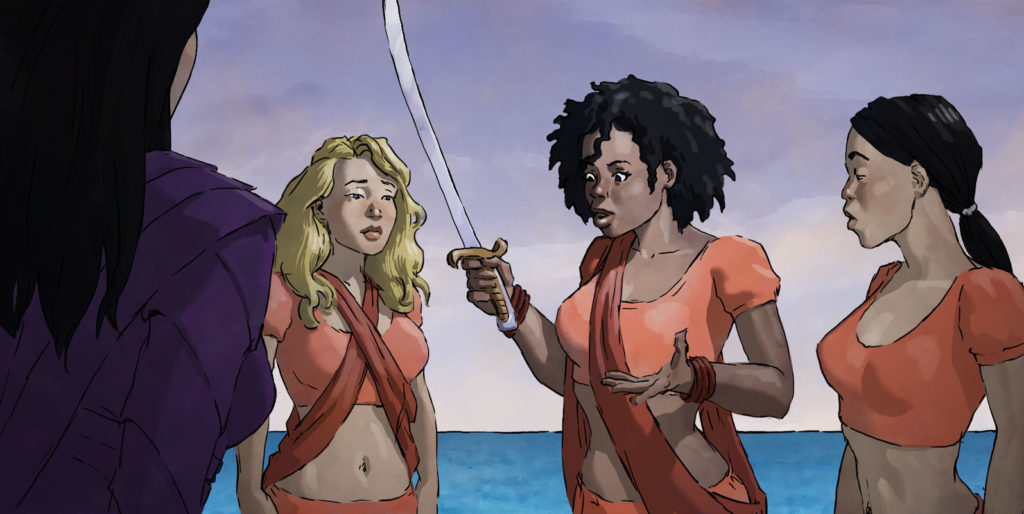
“How can any man be so heartless?” Nacia Oriandra turned to confront the Nightling Thaumaturge.
“It was your wish to be the most desired woman in the Five Kingdoms.” Cagi looked offended. “I am merely your servant.”
“You deceived me!”
“Men desire most that which they can never possess.” The birds that formed his cloak became restless once again. “Don’t blame me for human nature.”
With that, the tall man’s form dispersed into a flock of ravens and took wing. A moment later, the four women were alone on the beach with a launch they could not sail and three dead men at their feet.
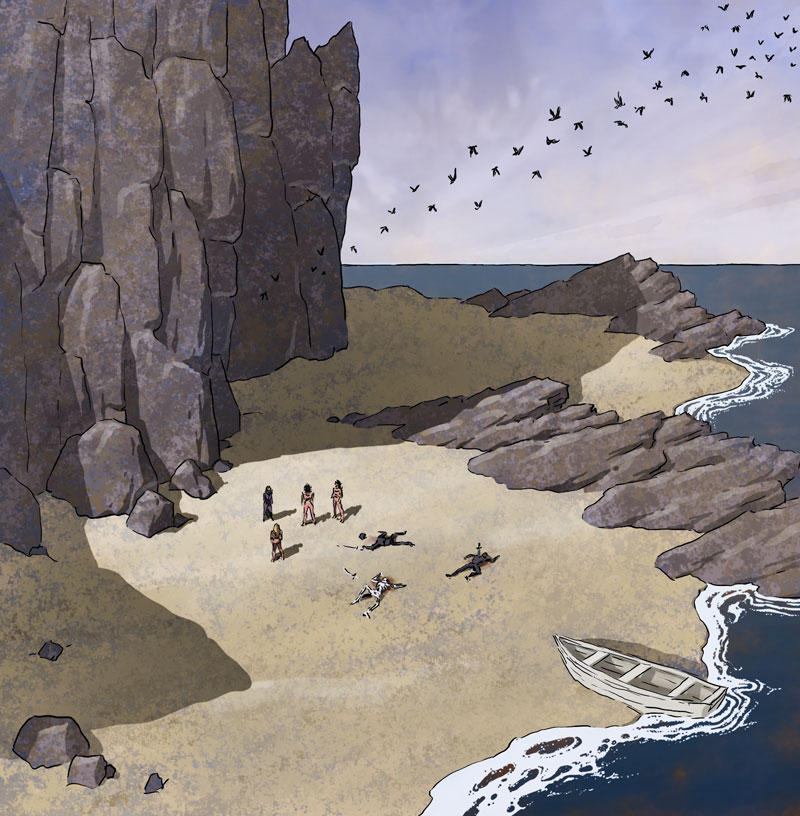
The first thing Durn asked himself when he opened his eyes was, “Why is there a flock of ravens flying over me?” The second thing was, “Where the hell am I?”